Glenn Carle”
post_date=”August 23, 2025 05:58″
pUrl=”https://www.fairobserver.com/world-news/us-news/fo-talks-donald-trump-2-0-are-lunatics-now-running-the-asylum/” pid=”157309″
post-content=”
[Though this video is not recent, the authors’ discussion remains relevant today.]
Fair Observer Founder, CEO & Editor-in-Chief Atul Singh and retired CIA Officer Glenn Carle dissect the question: “Donald Trump 2.0: Are lunatics now running the asylum?” Speaking from his experience in intelligence and analysis, Glenn delivers a sobering assessment of US President Donald Trump’s movement, the myth of the “deep state,” and the dangers of Project 2025.
The Trump phenomenon and the sincerity of supporters
Glenn begins by questioning the phrase “lunatics running the asylum.” Calling Trump’s allies lunatics, he says, is too generous, since lunatics are not necessarily duplicitous. The real danger, Glenn insists, is the sincerity of Trump’s supporters.
Polls show that around 40% of Americans are indifferent to democracy and the rule of law. Many openly prefer a strongman who can “get things done” regardless of constitutional limits. For these Americans, politics feels distant, even irrelevant, compared to everyday issues like potholes, taxes or classroom sizes.
Glenn argues that ordinary people, even those who consider themselves honorable, fall in line with authority. He recalls colleagues at the CIA rationalizing torture because “our boss said it’s okay.”
Atul extends the point to history: Countless “good people” served Joseph Stalin, Indira Gandhi or Adolf Hitler not out of villainy, but because they went along with inherited systems. Human nature explains the willingness to comply.
Human nature and historical blind spots
Glenn pushes back against the American belief in exceptionalism. After World War II, many assumed Germans must have been “intrinsically different” to have committed atrocities, while Americans told themselves, “We would never do that.” Glenn rejects this as a blind assumption. Faced with the choice to kill or be killed, he argues, ordinary citizens anywhere can become executioners.
This perspective shapes how he evaluates Trump and his allies. US Director of National Intelligence Tulsi Gabbard, FBI Director Kash Patel, US Secretary of Defense Pete Hegseth and Trump himself, he says, combine true belief, ambition, opportunism and lack of principle. He highlights something especially troubling: Trump’s statements often repeat Kremlin talking points verbatim.
Glenn poses a rhetorical question: “Have you ever met someone who agrees with you on every single political issue?” Since the answer is no, perfect alignment with Russia’s messaging should alarm Americans.
The CIA, independence and the deep state
Glenn then turns to the intelligence community. The CIA’s mission, he stresses, is to deliver independent, objective analysis — often inconvenient for presidents. The agency warned against escalation in Vietnam, questioned false claims about weapons of mass destruction and provided fact-based views that cut against political narratives.
Glenn recalls one moment vividly: A secretary of defense staffer once glared at him and told him, “You [the CIA] are the enemy.” That hostility, he says, now fuels Trump’s push to “clean house,” eliminating intelligence officials not loyal to him. While all presidents try to steer the CIA, Glenn views Trump’s vendetta as part of a much darker campaign.
Project 2025: a blueprint for authoritarianism
Glenn warns most urgently about Project 2025, a conservative blueprint for the second Trump administration. He calls it “frankly lunatic” and “profoundly dangerous.” Its pages describe civil servants as “cultural Marxists,” depict bureaucracies as proof of totalitarianism and demand loyalty over expertise.
The CIA, Glenn argues, reflects America’s political diversity. Analysts skew toward evidence-based centrism, not ideology. Yet when fact-driven analysis contradicts right-wing preferences — such as skepticism toward Israeli hardline policies — Republicans brand it “biased” or “Marxist.”
For Glenn, the very idea of a deep state is a fascist myth. He traces it back not only to Turkey but to Italian dictator Benito Mussolini and German Führer Adolf Hitler. In this view, the government was cast as oppressive, bureaucrats as conspirators, and only a single strong leader could defend the people. This narrative, Glenn says, resurfaces in modern America through the far-right QAnon movement and the Trump administration.
Bureaucracy, regulation and social frustration
Glenn concedes there is a grain of truth: Bureaucracies can be slow, cautious and resistant to change. Yet this is far from sabotage. Instead, he sees tension in the complexity of modern societies. Democracies need regulation to balance competing interests, but rules often feel burdensome. Citizens lash out at the bureaucrat enforcing them, blaming individuals for systemic problems.
The real challenge is balance. Too much regulation stifles freedom, but unregulated capitalism produces monopoly, exploitation and oligarchy. Glenn believes the United States achieved its best balance between 1933 and 1980, with a regulated market economy under democratic oversight. Since 1980, he says, deregulation has gone too far.
Demographic change and the politics of belonging
Glenn also links Trump’s rise to demographic shifts. In 1956, the US was 89% white. By 2030, the figure will drop below half. Diversity brings enormous benefits, he notes, but it also stresses social cohesion. Sociologists show that when minorities exceed 10% of a population, unrest tends to rise. Integration typically takes three generations. Today’s backlash, Glenn suggests, comes from Americans overwhelmed by change and searching for scapegoats.
DOGE and the erosion of accountability
The proposed Department of Governmental Efficiency (DOGE) becomes Glenn’s case study in authoritarian governance. Marketed as an anti-waste reform, it actually dismantles oversight offices and suspends anti-corruption measures like the Foreign Corrupt Practices Act. Having spent his career in government, Glenn insists fraud is rare. DOGE, he warns, creates more corruption, not less.
He argues that while reducing government size is not inherently harmful, DOGE’s cuts are “extra-legal,” meaning illegal. The true purpose is not efficiency but to impose orthodoxy, silence dissent and centralize power. Such moves, Glenn concludes, lead to cronyism, corruption and “the loss of democracy and individual rights.”
Rejecting the strongman narrative
Atul asks if Trump could be a Julius Caesar-like figure rescuing America from dysfunction. Glenn strongly disagrees. Caesar destroyed the Roman Republic, while French General Napoleon Bonaparte left tens of millions dead. America’s crisis, he says, is different. The nation has always harbored authoritarian, isolationist and racist currents, but never before have they dominated the entire system.
Still, Glenn emphasizes the progress of the American experiment. Over centuries, the definition of who counts as fully human has expanded — a triumph of US history. Today’s effort to roll back these rights, he argues, contradicts American ideals and undermines the possibility of a pluralistic society.
Facts, lies and the corrosion of truth
Glenn closes with a blunt message: “There are objective facts.” Policy debates are legitimate, but persisting in falsehoods is not disagreement — it is lying. He accuses Trump allies, including Patel and Gabbard, of spreading claims proven false. He concludes that Project 2025 rests on lies, and repeating untruths is willful corruption — corrosive, dangerous and profoundly authoritarian.
[Lee Thompson-Kolar edited this piece.]
The views expressed in this article/video are the author’s own and do not necessarily reflect Fair Observer’s editorial policy.
”
post-content-short=”
Fair Observer Founder, CEO & Editor-in-Chief Atul Singh and retired CIA Officer Glenn Carle dissect the question: “Donald Trump 2.0: Are lunatics now running the asylum?” Speaking from his experience in…”
post_summery=”In this episode of FO° Talks, Atul Singh and Glenn Carle discuss US President Donald Trump’s administration and DOGE. Glenn warns that Trumpism rests not on lunacy but on sincere belief, opportunism and authoritarian instinct. He rejects myths of the deep state, denounces Project 2025 as fascist and sees DOGE as a tool for silencing dissent.”
post-date=”Aug 23, 2025″
post-title=”FO° Talks: Donald Trump 2.0: Are Lunatics Now Running the Asylum?” slug-data=”fo-talks-donald-trump-2-0-are-lunatics-now-running-the-asylum”>
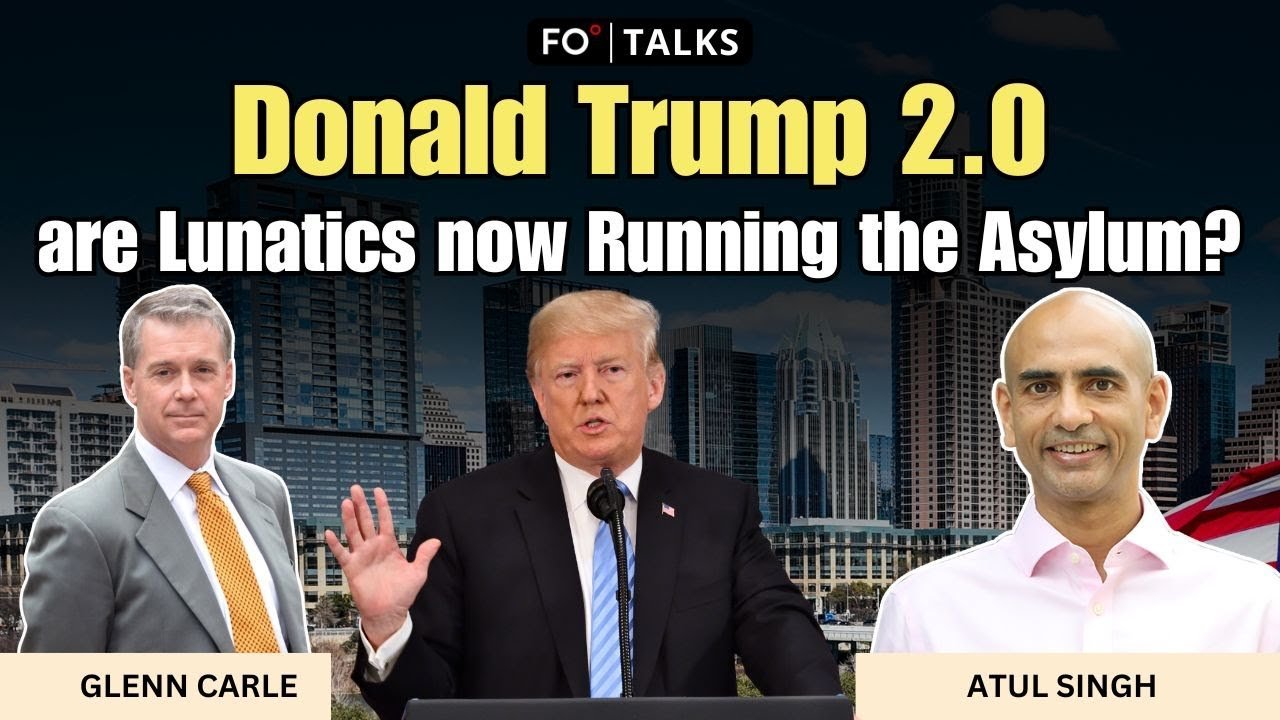
FO° Talks: Donald Trump 2.0: Are Lunatics Now Running the Asylum?

Abdullah O Hayek”
post_date=”August 22, 2025 06:39″
pUrl=”https://www.fairobserver.com/world-news/middle-east-news/fo-talks-will-iran-deploy-thousands-of-sea-mines-in-the-strait-of-hormuz/” pid=”157288″
post-content=”
[As of the filming of this episode, Iran has not mined the Strait of Hormuz, nor does anyone know for certain that they will.]
Fair Observer’s Video Producer & Social Media Manager, Rohan Khattar Singh, talks with Abdullah O Hayek, an independent Middle East analyst and peace fellow at Young Voices. Hayek assesses Iran’s potential deployment of sea mines in the Strait of Hormuz. He covers the immediate consequences for global shipping and energy markets. He also examines the nation’s capital, Tehran’s, strategic aims, the credibility of the regime’s threat, and the economic, diplomatic and military costs Iran faces.
Disrupting a critical energy chokepoint
Hayek stresses that mining the Strait of Hormuz would instantly threaten one of the world’s most vital energy arteries. The waterway is extremely narrow — less than two miles wide in certain areas — and carries 18 to 20 million barrels of oil and over a billion cubic feet of liquefied natural gas (LNG) each day. This amounts to about 20% of global seaborne petroleum and roughly a quarter of all LNG traded internationally.
Even without detonations, the detection of mines triggers a freeze in tanker traffic as maritime insurers withdraw coverage. Hayek estimates that a small mining campaign halts flows within a week and that clearing a safe corridor takes a month or longer. This causes an immediate and severe energy crisis.
Oil prices spike from $70 to $150 per barrel, hitting Asia’s major importers — China, India, Japan and South Korea — with rationing, higher fuel costs and industrial slowdowns. Gulf producers like Saudi Arabia and the United Arab Emirates can offset only about half the lost supply. Beyond energy, freight rates surge, supply chains from electronics to agriculture suffer and vulnerable economies face recessionary pressure.
Asymmetrical maritime deterrence
Hayek frames Iran’s approach as part of a broader asymmetrical deterrence strategy that already includes proxies, drones and missiles. Sea mines extend this into maritime warfare. US intelligence recently observed Iranian vessels loaded with mines after US strikes in June, though none were deployed. Hayek sees this as deliberate signaling — a show of capability intended to raise the global costs of escalation.
Historical precedent reinforces the threat: During the Iran–Iraq War of the 1980s, mining the Gulf sharply drove up oil prices. Domestically, Iran’s parliament passes a near-unanimous, symbolic resolution to close the Strait, underscoring internal unity behind this maritime narrative. Regionally, such a move warns Gulf states and US bases of Tehran’s ability to disrupt their energy lifelines at will. Globally, it aims to strengthen Iran’s position in nuclear or sanctions talks.
A credible and diverse arsenal
Iran’s mines need to be taken seriously. Hayek cites estimates of 5,000 to 6,000 mines in the country’s arsenal, including bottom, contact, acoustic, pressure-sensor, drifting, limpet and rocket-assisted types. This variety, he argues, makes the Gulf “a living hell” for shipping. Even partial mining can be nearly as effective as a full closure, as the threat alone deters operations.
Iran’s naval capabilities, including midget submarines, fast attack boats, drone swarms and missiles, complicate clearance operations and heighten risks for countermine forces. Hayek’s conclusion is unequivocal: Iran has the means, geography and intent to create serious disruption.
The costs of escalation
Hayek also outlines why Iran may hesitate:
Economic costs: Mining the Strait effectively cuts off its own oil exports — 1.5 to two million barrels per day — much of which goes to China. For an already-sanctioned economy, losing this revenue is “economic suicide.” Short-term price spikes do not compensate for lost volume.
Diplomatic costs: Major customers like China, India, Japan and South Korea condemn the move. Even Russia may caution against it as short-sighted. Gulf states could accelerate alternative pipelines and LNG routes, permanently eroding Iran’s leverage.
Military costs: A closure attempt justifies a broad US-led military response, potentially resembling the 1991 coalition against Iraq. Such action could inflict civilian casualties, damaging Iran’s domestic legitimacy and fueling regime-change sentiment.
Washington’s calculus
Turning to US politics, Hayek notes US President Donald Trump’s longstanding opposition to new wars and emphasis on ending existing conflicts. Within the Make America Great Again movement, there is strong resistance to direct intervention, even in the face of Iranian provocations. Hayek argues that deploying US troops to Iran would be “Iraq 2.0” — a decade-long conflict with global and domestic consequences.
Instead, Hayek recommends that Washington equip regional allies to manage the crisis, resorting to military measures only if diplomacy fails. Iran, he warns, is “the most difficult hardened adversary” the United States has faced. It has a tricky blend of population size, missile capability, drones and asymmetrical naval tactics that complicates any conventional campaign.
Regional power and the question of regime change
Hayek states his personal support for regime change in Tehran but insists it should come from within, led by Iranians themselves. Iran continues to wield regional influence through asymmetrical tools while remaining an international pariah, isolated economically and diplomatically. Total collapse appears unlikely in the near term, though economic crisis, severe inflation, mass protests, elite divisions and major military losses could open a path to change.
Hayek cautions that foreign intervention only strengthens the regime’s image and rallies nationalist support, as seen during the June conflict. The most plausible path to change, he argues, is sustained domestic protest and strategic patience from global powers.
To conclude, Khattar Singh notes that Iran still sees itself in an ongoing struggle with regional and global powers. The Strait of Hormuz, the Red Sea and the broader Middle East remain volatile despite pauses in open fighting. Hayek’s analysis underscores that while mining the Strait could give Iran short-term leverage, the long-term costs — economic, diplomatic and military — risk being devastating for both Tehran and the global economy.
[Lee Thompson-Kolar edited this piece.]
The views expressed in this article/video are the author’s own and do not necessarily reflect Fair Observer’s editorial policy.
”
post-content-short=”
Fair Observer’s Video Producer & Social Media Manager, Rohan Khattar Singh, talks with Abdullah O Hayek, an independent Middle East analyst and peace fellow at…”
post_summery=”In this episode of FO° Talks, Rohan Khattar Singh and Abdullah O Hayek discuss the possibility of sea mines in the Strait of Hormuz, which US intelligence suspects Iran will deploy. Hayek highlights the severe risks they’ll pose for global energy supplies and trade. He explains how mining the Strait fits into Iran’s asymmetrical deterrence strategy and weighs the costs Tehran could face.”
post-date=”Aug 22, 2025″
post-title=”FO° Talks: Will Iran Deploy Thousands of Sea Mines in the Strait of Hormuz?” slug-data=”fo-talks-will-iran-deploy-thousands-of-sea-mines-in-the-strait-of-hormuz”>
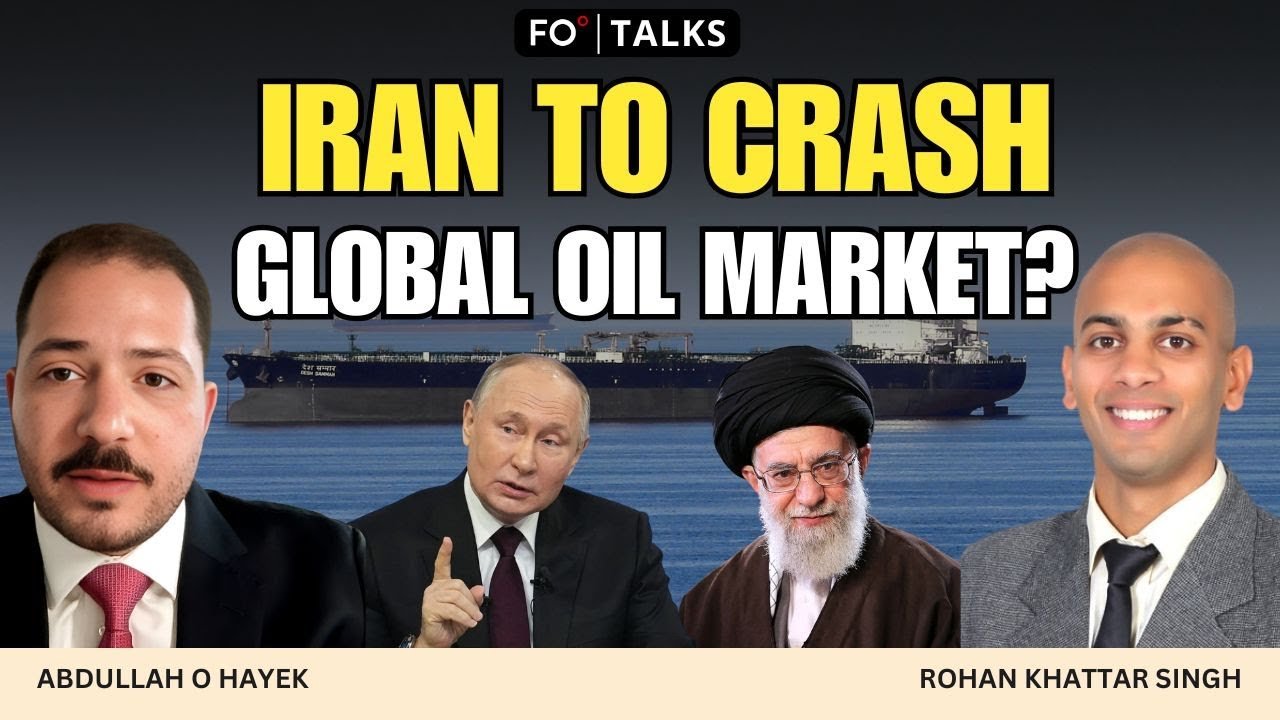
FO° Talks: Will Iran Deploy Thousands of Sea Mines in the Strait of Hormuz?

Jean-Daniel Ruch”
post_date=”August 21, 2025 06:38″
pUrl=”https://www.fairobserver.com/world-news/middle-east-news/fo-talks-europe-watches-silently-as-israel-continues-to-bomb-gaza/” pid=”157273″
post-content=”
Fair Observer Chief Strategy Officer Peter Isackson and former Swiss Ambassador Jean-Daniel Ruch discuss the Twelve-Day War between Israel and Iran, its deeper historical roots and the shifting global power dynamics around it. Drawing on his previous experience as ambassador to Serbia, Montenegro, Israel and Turkey, Ruch places the conflict in the long continuum of Persian and Middle Eastern geopolitics. Iran’s strategic position has been central to global power calculations since British geographer Halford Mackinder’s Heartland Theory — that he who rules Eastern Europe ultimately commands the world.
The Twelve-Day War: a managed clash with lasting risks
Ruch describes the recent conflict as an “acute phase” in an ongoing geopolitical struggle — one that may see similar flare-ups in the coming months. Both sides declared victory, but the outcome is ambiguous, with limited public evidence of damage. He argues the confrontation was “choreographed” to avoid mass casualties, with prior signaling and removal of sensitive materials from targeted facilities. While US President Donald Trump had promised to avoid new wars, Ruch views this as a calculated one-off strike, not an opening salvo. Still, he warns that a return to snapback sanctions under the Joint Comprehensive Plan of Action could push Iran toward leaving the Nuclear Non-Proliferation Treaty, escalating the risk of wider conflict.
Ruch is skeptical of claims that Israel’s nuclear-related bombing raids dealt decisive blows. In his view, much of the official Israeli narrative exaggerates successes and downplays the degree of Iranian resilience. He notes that Iran’s retaliatory strike on an “empty base” signaled an intent to save face without triggering uncontrolled escalation. The pause following the war serves both sides’ logistical needs — to resupply, regroup and plan for what could be a renewed confrontation within three to five months.
Netanyahu’s strategy and Israeli objectives
For Ruch, Israeli Prime Minister Benjamin Netanyahu’s political survival hinges on prolonging two “forever wars” — one in Gaza and one with Iran. He argues that Netanyahu has long sought direct strikes on Iran and that current policy leaves little room for compromise, especially on ceasefires that might satisfy the Hamas terror group’s demands. Accepting such terms would fracture Netanyahu’s coalition as extremist ministers abandon the government. Ruch is sharply critical of reported Israeli plans for mass displacement of Gaza’s population, calling them war crimes and possibly evidence of genocidal intent.
Strategically, Ruch sees Israel aiming to weaken Iran to the point of state failure, breaking it into several parts as occurred with Syria. But the Twelve-Day War, he contends, achieved the opposite — strengthening Iranian nationalism, uniting the population behind the regime and boosting hardliners opposed to any US-brokered nuclear agreement. He also points to covert operations inside Iran, allegedly involving the Mojahedin-e-Khalq, but considers them rare, high-preparation events unlikely to be repeated soon.
Europe’s role and strategic blind spots
Ruch warns that European moves toward snapback sanctions would mark a dangerous “first step [on] the escalation ladder,” providing hardliners in Tehran, Iran, justification to pursue nuclear weapons. He questions why Europe would join a US–Israeli confrontation with Iran while simultaneously managing the war in Ukraine. In his view, Europe’s genuine strategic interests lie in ending conflict with Russia, restoring affordable energy and reopening trade corridors to Asia. Yet leadership in Brussels, Paris, London and Berlin appears aligned with US and Israeli policy goals, often without robust parliamentary debate.
He notes that despite high energy costs and inflation, European publics have not mounted large-scale protests to shift foreign policy. Current political elites remain entrenched even when their popularity is low, as seen in European Commission President Ursula von der Leyen’s easy reelection despite her “less than optimal” record.
Former French Prime Minister Dominique de Villepin emerges in his account as a rare establishment figure advocating true European strategic autonomy based on international law. However, Ruch doubts de Villepin’s chances, citing weak political machinery and a media environment that largely reinforces pro-NATO, pro-US positions.
Geopolitical corridors and competing agendas
The conversation broadens to the global contest over trade and transit routes. Ruch links Western pressure on Iran to efforts to block BRICS-aligned projects like the North–South corridor and China’s Belt and Road routes. Shifting freight from Western-controlled sea lanes to land corridors threatens US maritime dominance. Western powers are promoting alternatives via Israel, Syria and Turkey under the Abraham Accords framework. In the Caucasus, projects like the Zangezur corridor could bypass Iran entirely, connecting energy-rich Azerbaijan directly to European markets.
Ruch sees Turkey, Iran and Israel as the region’s most influential actors, often rivals but occasionally aligned — especially in containing Iranian influence in Syria. He also laments missed diplomatic opportunities, such as a Saudi–Egyptian plan for Gaza’s reconstruction that was ignored by Israel and overlooked by Western powers.
Decline of diplomacy and rise of security networks
Ruch laments that diplomacy has been sidelined in favor of intelligence networks and the military–industrial complex. He argues the latter now shapes Western foreign policy more than elected leaders do. He warns that this entrenched “warmongering machinery” channels funding and political will toward militarization while marginalizing arms control or peace initiatives. Unlike the Cold War era, he sees little appetite for negotiated security frameworks.
A call for an independent strategic culture
Ruch concludes by urging citizens to cultivate independence, impartiality and mutual respect while holding all violators of international law accountable. Only by rejecting permanent confrontation can the world address shared existential challenges, from climate change to artificial intelligence, and build a truly cooperative global order.
[Lee Thompson-Kolar edited this piece.]
The views expressed in this article/video are the author’s own and do not necessarily reflect Fair Observer’s editorial policy.
”
post-content-short=”
Fair Observer Chief Strategy Officer Peter Isackson and former Swiss Ambassador Jean-Daniel Ruch discuss the Twelve-Day War between Israel and Iran, its deeper historical roots and the shifting global power dynamics around it. Drawing on his previous experience as ambassador to Serbia, Montenegro,…”
post_summery=”In this episode of FO° Talks, Isackson and Ruch analyze the 12-day Israel–Iran war, framing it as part of a long-standing geopolitical struggle. He examines Israeli Prime Minister Benjamin Netanyahu’s political strategy, the risks of European alignment with US and Israeli policies and the potential consequences of renewed sanctions. Escalating tensions could push Iran toward nuclear weapons.”
post-date=”Aug 21, 2025″
post-title=”FO° Talks: Europe Watches Silently as Israel Continues to Bomb Gaza” slug-data=”fo-talks-europe-watches-silently-as-israel-continues-to-bomb-gaza”>
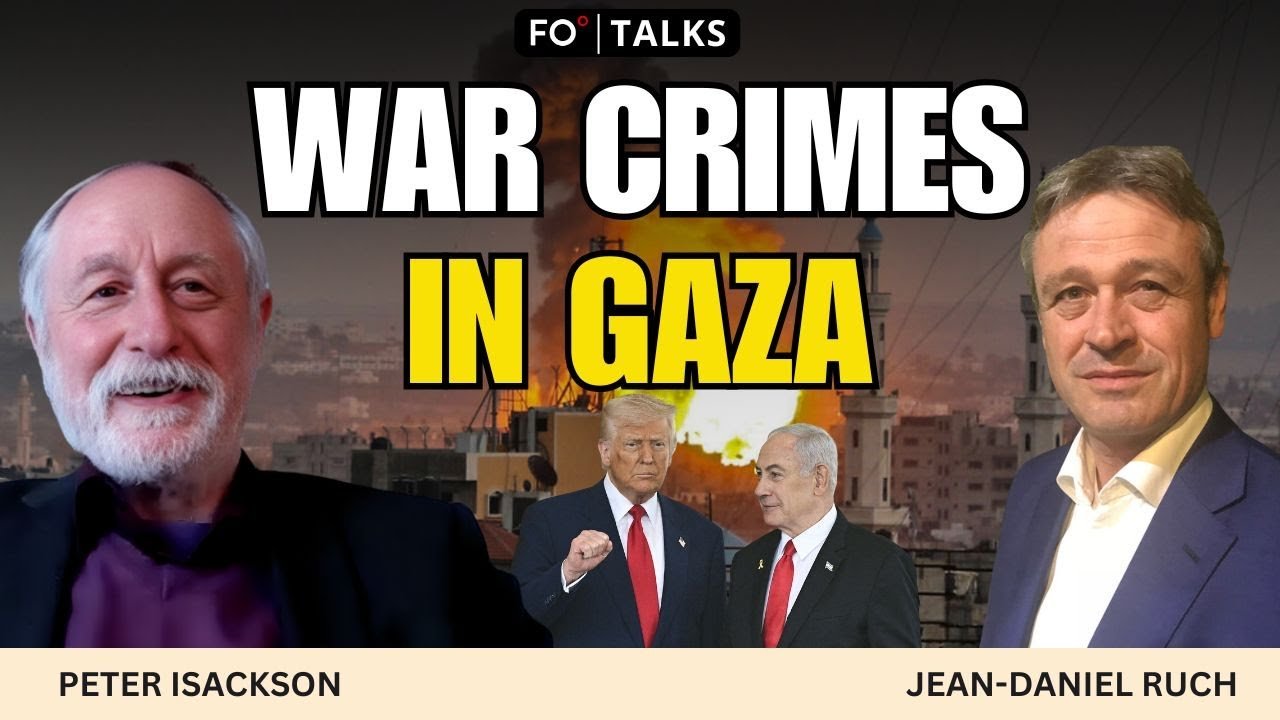
FO° Talks: Europe Watches Silently as Israel Continues to Bomb Gaza

Stephen Zunes”
post_date=”August 20, 2025 07:48″
pUrl=”https://www.fairobserver.com/world-news/middle-east-news/fo-talks-iran-vows-stronger-response-if-attacked-again-by-america-israel/” pid=”157262″
post-content=”
Fair Observer Founder’s Video Producer & Social Media Manager, Rohan Khattar Singh, talks with Steven Zunes, director of Middle Eastern Studies and professor of politics at the University of San Francisco. They analyze the US–Israel–Iran relationship and its broader implications. Zunes traces Washington’s hostility toward Tehran, Iran, to the 1979 Iranian Revolution that overthrew the Shah, Mohammad Reza Pahlavi. He was a US ally installed with CIA support in 1953.
For decades, US policy debates have been split between Democrats favoring diplomacy and sanctions, and Republicans or hawkish Democrats backing direct military measures. Although US President Donald Trump campaigns against “never-ending wars,” Zunes argues his administration shows readiness to back action against Iran, either directly or via Israel, calling recent US-supported airstrikes on Iranian territory a “dangerous escalation” that risks destabilizing the wider region and provoking further retaliatory cycles.
He stresses that such strikes violate the United Nations Charter, which permits force only in self-defense or with Security Council approval. Customary international law allows for preemptive military action, but it is narrowly defined. Zunes maintains that Iran is “years away” from a bomb.
He also criticizes Trump’s disregard for US constitutional requirements, noting that offensive operations require Congressional approval under the Constitution and the War Powers Act of 1973. On Trump’s push for a new Iran deal, Zunes says abandoning the Joint Comprehensive Plan of Action (JCPOA) undermines credibility. This agreement from the era of US President Barack Obama makes it “physically impossible for Iran to develop a nuclear weapon.” In Zunes’s view, Trump’s claim that he can negotiate better terms is “naive or disingenuous,” reflecting a strategy to weaken Iran rather than resolve the nuclear dispute.
Iran’s foreign ties and nuclear ambitions
Zunes describes Iran’s growing links with Russia and China, including arms sales to Russia and oil exports to China, as an “alliance of convenience” rather than an ideological partnership. He doubts these relationships will significantly alter the regional balance, noting that both powers see Iran as a problematic partner with its own agenda and internal contradictions.
On the nuclear question, Zunes says there is “no indication” Iran has decided to build a warhead, though it began enriching uranium beyond JCPOA limits after the US withdrawal. He recalls Iran’s earlier weapons research in the late 1990s and early 2000s, largely driven by fears of Iraq, but says there is no evidence of such work since.
Zunes warns that bombings could convince Iranian leaders they need a deterrent, citing Iraq’s invasion after disarmament versus North Korea’s survival with nuclear arms. He calls Iran’s civilian nuclear program “unnecessarily provocative” given its energy resources and ability to import nuclear materials for peaceful purposes. While Western responses are aggressive, he says Iran could take steps to ease tensions and signal a genuine interest in reducing hostilities.
National pride, regional role and Gulf state positions
Even Iranians who oppose the regime, Zunes says, resent being singled out when other regional states possess nuclear weapons. He believes recent conflicts strengthen hardliners and weaken opposition movements that struggle to organize under restrictive conditions.
In the Gulf, Saudi Arabia, the United Arab Emirates and Qatar oppose Iran’s nuclear ambitions but remain wary of military escalation, recognizing that war could destabilize the region and threaten vital shipping routes. These monarchies, Zunes argues, take a more pragmatic approach than Washington, accepting Iran’s influence and acknowledging the need for negotiation.
Israel–Iran tensions and strategic calculations
Zunes notes Israel’s recent strikes across the Middle East and the damage caused by Iranian missile attacks — a rare experience for Israeli cities. While some Israeli leaders may prefer caution, he identifies hardliners who benefit from prolonging the Iran crisis, as it shifts international focus from Gaza and alleged Israeli war crimes. These hawks often frame the confrontation as existential in order to consolidate domestic political support and deter compromise.
Zunes predicts an ongoing pattern of low-level confrontation rather than a large-scale war.
The Palestinian question and the shifting debate
The Israel–Iran conflict diverts attention from Gaza, where Zunes has long supported a two-state solution. He argues that settlement expansion and US backing make such a solution increasingly impossible, shifting the conversation toward an apartheid framework. Citing major human rights organizations, he says Israel’s system meets the legal definition of apartheid and warns that unconditional US support may face growing political resistance, particularly among younger Americans and within some progressive movements.
Zunes maintains that arguments should be rooted in universal human rights and international law rather than ideology. Continued settlement expansion, he warns, harms Palestinians, fuels extremism and undermines the global legal order.
This erosion of the rules-based order produces ripple effects far beyond the Israel–Palestine context, weakening the credibility of international institutions in conflicts from Ukraine to the Western Sahara. In the US, he sees a widening divide between the political establishment and grassroots activists, with the latter increasingly vocal in demanding conditional aid and sanctions.
European allies, while slower to shift their stances, face internal pressure from civil society and political opposition parties to align policy with human rights law rather than strategic expedience. These dynamics, Zunes suggests, could reshape the diplomatic landscape over the next decade.
While he fears it may be too late for a two-state solution, he insists that international law must guide all discussions.
[Lee Thompson-Kolar edited this piece.]
The views expressed in this article/video are the author’s own and do not necessarily reflect Fair Observer’s editorial policy.
”
post-content-short=”
Fair Observer Founder’s Video Producer & Social Media Manager, Rohan Khattar Singh, talks with Steven Zunes, director of Middle Eastern Studies and professor of politics at the University of San Francisco. They analyze the US–Israel–Iran relationship and its broader implications. Zunes…”
post_summery=”In this episode of FO° Talks, Rohan Khattar Singh and Stephen Zunes examine the US–Israel–Iran relationship. The latter argues that Trump’s Iran policy undermines international law, escalates tensions and abandons effective diplomacy. He warns that recent airstrikes may push Iran toward nuclear deterrence, critiques Israel’s use of the crisis to deflect from Gaza and highlights growing challenges to unconditional US support for Israel.”
post-date=”Aug 20, 2025″
post-title=”FO° Talks: Iran Vows Stronger Response If Attacked Again By America, Israel” slug-data=”fo-talks-iran-vows-stronger-response-if-attacked-again-by-america-israel”>
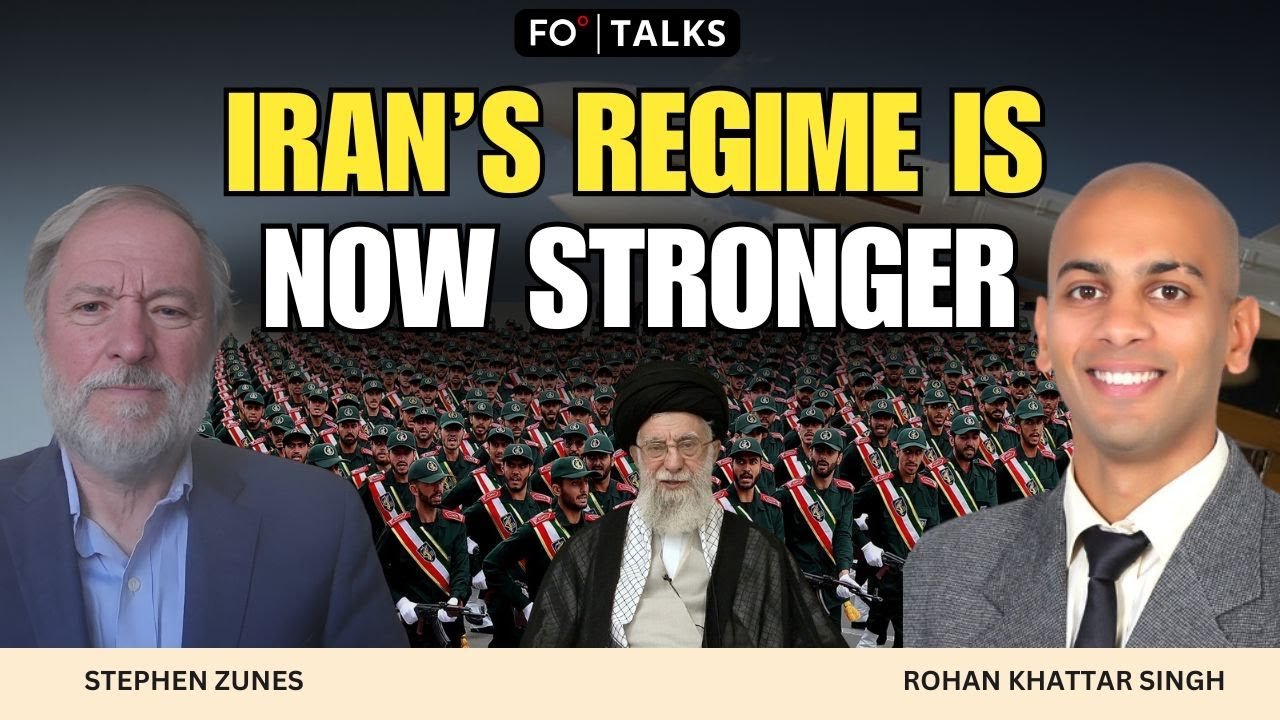
FO° Talks: Iran Vows Stronger Response If Attacked Again By America, Israel

Thomas Greminger”
post_date=”August 18, 2025 07:07″
pUrl=”https://www.fairobserver.com/region/europe/fo-talks-trump-dominates-nato-summit-as-europe-pledges-5-to-defense/” pid=”157231″
post-content=”
Fair Observer Founder, CEO & Editor-in-Chief Atul Singh and the Executive Director of the Geneva Centre for Security Policy, Thomas Greminger, discuss the recent NATO summit and its implications for Europe. Greminger credits NATO Secretary General Mark Rutte with containing US President Donald Trump’s volatility and ensuring the alliance “survived that summit.” However, he warns its medium-term future remains unpredictable under Trump.
At the summit, Europe pledged to spend 3.5% of GDP on defense and 1.5% on areas like cybersecurity and infrastructure, totaling 5%. Greminger sees political resolve to invest more, but doubts all NATO members can or will reach the target. He believes it is largely a concession to please Washington.
Meeting the 5% target could undermine social stability
Singh presses on where Europe will get its funds, given its aging populations, high debt and fragile welfare systems. Greminger predicts significant “crowding out” of spending on health, education, diplomacy and other needs. Such trade-offs could fuel populism on both ends of the political spectrum. He agrees that the political backlash could be substantial if social safety nets erode in pursuit of military targets.
Europe faces a security threat mix that stretches resources thin
Greminger outlines Europe’s security environment as a mix of conventional military risks, primarily from Russia, and hybrid threats like cyberattacks and disinformation. Transnational dangers such as terrorism, violent extremism and trafficking persist, while climate change emerges as a new factor. Politicians face the challenge of stretching limited resources across defense, national resilience and social cohesion.
Globalization’s uneven rewards are weakening social cohesion
Addressing Singh’s intelligence concerns about marginalized youth — both disenfranchised Muslim communities and alienated working-class whites — Greminger says these trends have been building for over a decade. He links them to dissatisfaction with globalization, where perceptions of unequal benefit outweigh objective gains. Left unresolved, this discontent could undermine social cohesion across Europe, including in Switzerland.
Strategic autonomy is rising but Europe’s defense industry lags
Though the current trends are not a formal doctrine, Greminger sees growing determination to reduce dependence on Washington’s “moods” and unpredictability. Europeans have made efforts to unify major players, like the EU three — France, Germany and Italy — and strengthen independent capabilities. He suggests Trump may ironically be remembered as a promoter of European strategic autonomy.
Europe’s defense sector is not yet able to meet its demand, meaning militaries will continue buying US arms in the short to medium term. If the Ukraine war drags on, Europe may reindustrialize its defense base; if the conflict ends on acceptable terms, spending could decline as other priorities reassert themselves.
Trade tensions could erode the transatlantic alliance
Reconciling the US–Europe security partnership with growing trade disputes remains a challenge. Greminger warns that consistently hostile US trade policies will have political repercussions for NATO. Europeans may accept some unfriendly policies to preserve the alliance, but there are limits. Washington should act with care to avoid alienating its partners.
[Lee Thompson-Kolar edited this piece.]
The views expressed in this article/video are the author’s own and do not necessarily reflect Fair Observer’s editorial policy.
”
post-content-short=”
Fair Observer Founder, CEO & Editor-in-Chief Atul Singh and the Executive Director of the Geneva Centre for Security Policy, Thomas Greminger, discuss the recent NATO summit and its implications for Europe. Greminger credits NATO Secretary General Mark Rutte with containing US President Donald…”
post_summery=”In this episode of FO° Talks, Atul Singh and Thomas Greminger examine NATO’s survival after a tense summit, Europe’s defense spending goals and the strain they place on domestic priorities. Shifting resources to meet military targets could strain European social cohesion. Europe’s push for strategic autonomy, while promising, faces obstacles from US dominance and rising trade tensions.”
post-date=”Aug 18, 2025″
post-title=”FO° Talks: Trump Dominates NATO Summit as Europe Pledges 5% to Defense” slug-data=”fo-talks-trump-dominates-nato-summit-as-europe-pledges-5-to-defense”>
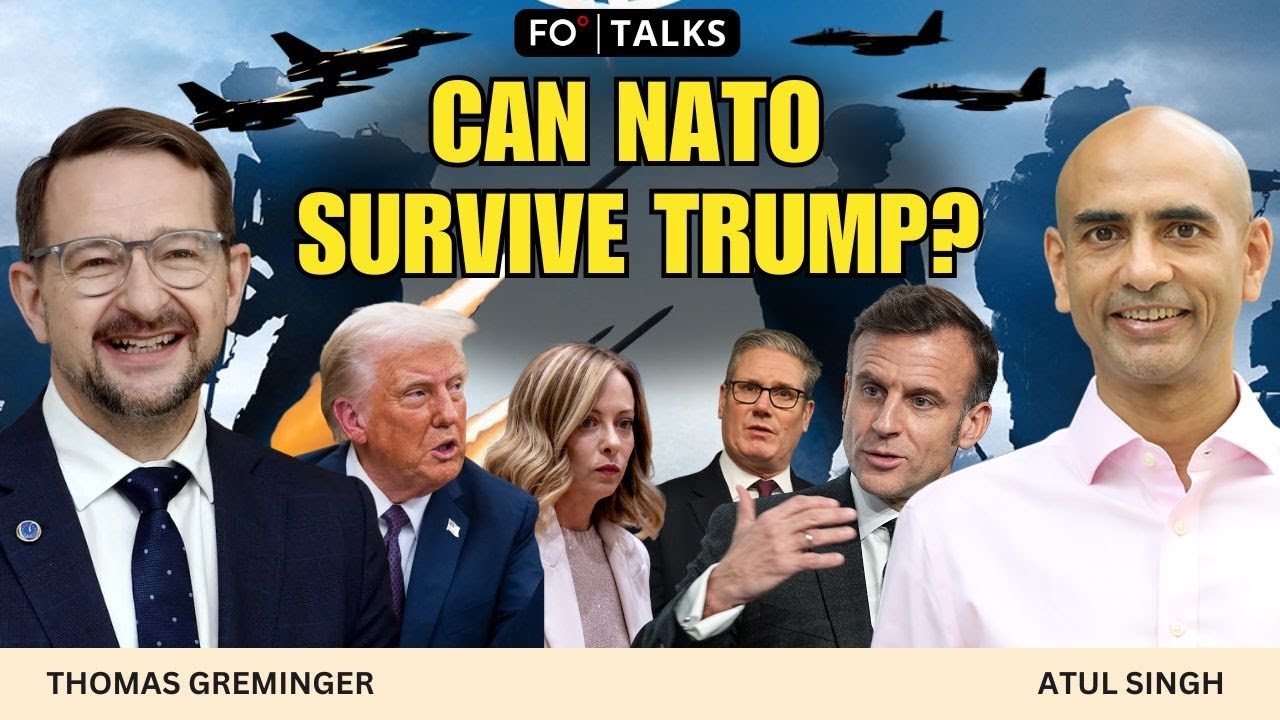
FO° Talks: Trump Dominates NATO Summit as Europe Pledges 5% to Defense

Glenn Carle”
post_date=”August 17, 2025 05:46″
pUrl=”https://www.fairobserver.com/world-news/fo-exclusive-trumps-epstein-files-fiasco-worsens-as-democrats-take-aim-at-the-president/” pid=”157214″
post-content=”
Fair Observer Founder, CEO & Editor-in-Chief Atul Singh and retired CIA Officer Glenn Carle discuss the political fallout surrounding the late sex trafficker Jeffrey Epstein and the scandal’s implications for US President Donald Trump. The scandal has re-entered the spotlight not just for its disturbing details, but for the way it fuels conspiracy theories and deepens divisions in American politics. With Trump’s name resurfacing in connection to Epstein, and his base growing restless over broken promises, the conversation probes the uneasy intersection of scandal, loyalty and public perception.
The Epstein scandal resurfaces
Atul and Glenn open the conversation by acknowledging that while Trump has faced many scandals — indictments, convictions and connections to suspected Russian agents — the Epstein case is gaining unusual traction. Glenn calls the affair both “farce” and “sick,” noting that the pedophilia aspect hits a nerve but is also steeped in conspiracy theories.
Epstein was a wealthy financier who used his fortune and connections to sexually exploit adolescent girls, aided by his partner, Ghislaine Maxwell. Glenn emphasizes that both were involved in grooming young women under the guise of employment, including as masseuses or assistants, to serve Epstein and his associates.
Atul interjects with a comment on social status and naming conventions, briefly linking the prominence of Epstein’s and Maxwell’s families to elite networks. He and Glenn note Epstein’s properties in New York and Palm Beach, Florida, and his infamous private island in the Virgin Islands, which served as the backdrop for much of the alleged abuse.
Legal troubles and a suspicious death
Epstein was arrested in 2005, convicted and sentenced to just 13 months in prison — a lenient outcome criticized as protecting powerful figures. A non-prosecution agreement shielded others who may have been implicated, including Trump, former US President Bill Clinton and lawyer Alan Dershowitz.
The case faded until 2018, when the Miami Herald newspaper interviewed survivors and revived public interest, resulting in Epstein’s rearrest. But before his new trial could begin, he was found dead in his prison cell under circumstances that Glenn and many others find deeply suspicious. Crucial surveillance footage vanished, and the prison guard assigned to watch him inexplicably left his post. Glenn sarcastically compares the event to a “Godfather movie or a Mossad operation.”
Trump, the client list and political blowback
Trump’s name appears repeatedly in the context of Epstein’s social circle. Though no illegal conduct has been publicly linked to Trump, Glenn and Atul explain how the mere association has political consequences — especially since Trump once vowed to release Epstein’s client list to expose elites like the Clintons. Once in office, however, he reportedly backed off after being told his own name appears in the testimony, though not as a client. This U-turn has enraged the conspiracy-minded Make America Great Again (MAGA) base that had hoped Trump would “drain the swamp” and hold elites accountable.
Another political flashpoint is the viral meme, “Epstein didn’t kill himself,” which has become a symbol of deep distrust in American institutions. Glenn expresses his disbelief at the convenient disappearance of the prison video and suggests the scenario reeks of a cover-up. Trump’s base feels betrayed — the justice it was promised never materialized. Glenn quips that Trump has gone from crusading against conspiracies to dismissing them as a distraction.
Impact on the political landscape
Despite the scandal, Glenn notes Trump’s poll numbers remain resilient. While most Americans disapprove of him, many MAGA supporters see the renewed attention to Epstein as just another Democratic attack. Traditional Republicans are divided — some approve, others disapprove and many claim not to know enough. Atul speculates the issue could hurt Republicans in the upcoming midterms, though he acknowledges that such damage might be modest.
Conspiracies, psychology and social media
Atul and Glenn go on to examine how conspiracy theories shape political behavior. Atul compares the dynamic to Soviet-era communists who reversed their beliefs overnight after the Molotov–Ribbentrop Pact of 1939, illustrating how tribal loyalty can override facts. Glenn adds that people often cling to the worldview of their “tribal leaders,” regardless of contradictory evidence.
While these psychological patterns aren’t new, social media has radically accelerated their spread.
Glenn shares a personal story about friends who fled the Soviet bloc and were lifelong anti-Russians — until they became fervent Trump supporters. These friends now see any criticism of Trump’s ties to Russia as betrayal, which Glenn finds both tragic and illustrative of the broader social phenomenon. In his view, the Epstein case may create political cracks for Trump, but not an existential collapse. Atul agrees that this scandal may leave a mark, just not a decisive one.
[Lee Thompson-Kolar edited this piece.]
The views expressed in this article/video are the author’s own and do not necessarily reflect Fair Observer’s editorial policy.
”
post-content-short=”
Fair Observer Founder, CEO & Editor-in-Chief Atul Singh and retired CIA Officer Glenn Carle discuss the political fallout surrounding the late sex trafficker Jeffrey Epstein and the scandal’s implications for US President Donald Trump. The scandal has re-entered the spotlight not just for…”
post_summery=”In this section of the July 2025 episode of FO° Exclusive, Atul and Glenn discuss the political fallout from the Jeffrey Epstein scandal and its potential impact on Donald Trump. Trump’s association with Epstein and failure to release the promised client list have frustrated his MAGA base. This conversation also explores conspiracy theories and psychological loyalty to political figures.”
post-date=”Aug 17, 2025″
post-title=”FO° Exclusive: Trump’s Epstein Files Fiasco Worsens as Democrats Take Aim at the President” slug-data=”fo-exclusive-trumps-epstein-files-fiasco-worsens-as-democrats-take-aim-at-the-president”>
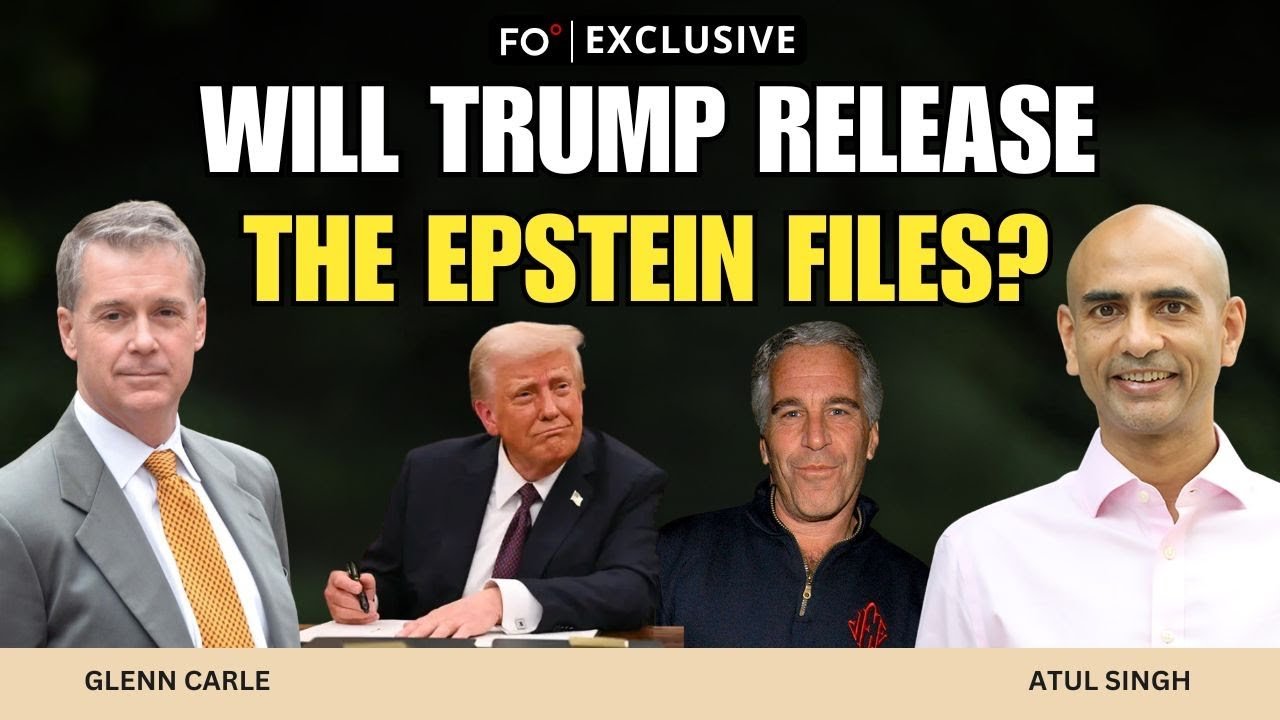
FO° Exclusive: Trump’s Epstein Files Fiasco Worsens as Democrats Take Aim at the President

Glenn Carle”
post_date=”August 16, 2025 07:13″
pUrl=”https://www.fairobserver.com/world-news/middle-east-news/fo-exclusive-trump-changes-tone-on-gaza-will-he-ditch-netanyahu-and-israel/” pid=”157201″
post-content=”
Fair Observer Founder, CEO & Editor-in-Chief Atul Singh and retired CIA Officer Glenn Carle unpack the worsening crisis in Gaza, shifting global sentiment toward Palestinian statehood, and how internal Israeli politics continue to drive the conflict. The discussion also highlights US President Donald Trump’s surprising rhetorical pivot, questions the role of international institutions and reflects on the broader geopolitical fallout.
Humanitarian collapse and the politics behind it
Starvation intensifies in Gaza despite Israeli claims of humanitarian pauses in their operations. The UN warns of impending famine, while Israeli human rights groups like B’Tselem accuse Israel of genocidal conduct. Atul and Glenn agree that the Israeli government’s far-right coalition and Israeli Prime Minister Benjamin Netanyahu’s political survival instincts fuel the war’s continuation, despite quiet dissent within Israeli military circles.
Trump’s rhetorical pivot and the decline of the UN
In a striking shift, Trump recently acknowledged “real starvation” in Gaza and suggested Israel — not the United Nations — should manage food aid. Atul views this as a symbolic sidelining of postwar international institutions. Critics call Jordan and the United Arab Emirates’s aid efforts ineffective, reflecting the broader failure of coordinated relief.
Europe’s response and the limits of diplomacy
France and the United Kingdom have signaled they may recognize a Palestinian state if Israel refuses a ceasefire. Atul attributes this to domestic political pressure. Glenn doubts the practical impact, asserting that only the United States and Israel hold real power. Still, he concedes these symbolic gestures could shift the political center of gravity over time.
Continuity in US policy and Netanyahu’s calculations
While Trump’s tone has changed, Glenn argues that both his and former US President Joe Biden’s policies have ultimately enabled Israel. Netanyahu has, in Glenn’s view, successfully manipulated US support, allowing him to pursue longstanding territorial goals. Atul agrees that US foreign policy has long protected Israeli impunity, regardless of who is in the White House.
Displacement, historical parallels and growing isolation
Glenn draws a controversial parallel between the displacement of Palestinians and the forced removal of Native Americans in US history. He argues that starvation and destruction in Gaza amount to de facto ethnic cleansing. Atul emphasizes that Israel’s international support is eroding, with the exception of Germany, which remains loyal due to Holocaust guilt.
Internal divides and unpredictable fallout
Atul points to Israel’s internal fractures, especially between secular and religious communities. He highlights early protests against Netanyahu and growing military dissatisfaction. He warns that the loss of support in culturally aligned regions like Europe could have lasting psychological and political consequences.
Atul closes by noting rising antisemitism, emboldened Muslim communities in Europe and the unpredictable “unknown unknowns” that may soon follow.
[Lee Thompson-Kolar edited this piece.]
The views expressed in this article/video are the author’s own and do not necessarily reflect Fair Observer’s editorial policy.
”
post-content-short=”
Fair Observer Founder, CEO & Editor-in-Chief Atul Singh and retired CIA Officer Glenn Carle unpack the worsening crisis in Gaza, shifting global sentiment toward Palestinian statehood, and how internal Israeli politics continue to drive the conflict. The discussion also highlights US President…”
post_summery=”In this section of the July 2025 episode of FO° Exclusive, Atul and Glenn discuss the worsening humanitarian crisis in Gaza. Starvation is escalating despite Israeli claims of humanitarian pauses, and even US President Donald Trump now acknowledges the crisis. Internal divisions in Israeli society are deepening, and symbolic diplomatic moves may set the stage for unpredictable geopolitical shifts.”
post-date=”Aug 16, 2025″
post-title=”FO° Exclusive: Trump Changes Tone on Gaza, Will He Ditch Netanyahu and Israel?” slug-data=”fo-exclusive-trump-changes-tone-on-gaza-will-he-ditch-netanyahu-and-israel”>

FO° Exclusive: Trump Changes Tone on Gaza, Will He Ditch Netanyahu and Israel?

Glenn Carle”
post_date=”August 15, 2025 05:17″
pUrl=”https://www.fairobserver.com/world-news/fo-exclusive-japan-eu-strike-trade-deals-as-trump-slaps-india-with-tariffs/” pid=”157184″
post-content=”
Fair Observer Founder, CEO & Editor-in-Chief Atul Singh and retired CIA Officer Glenn Carle unpack two major trade agreements recently concluded by the United States — one with the European Union and another with Japan. They analyze the terms of each deal and explore their deeper implications for global trade, economic stability and the evolving world order.
Atul identifies that both trade deals were finalized while US President Donald Trump was in Scotland, golfing and promoting his properties. European Commission President Ursula von der Leyen visited him in what Atul describes as “homage to Emperor Trump,” resulting in a preliminary EU–US agreement.
US–EU trade agreement: strategic concessions and investments
Under the deal, the US imposed 15% tariffs on European exports — especially automobiles — while exempting aircraft, shipbuilding equipment, chemicals and raw materials. In exchange, the EU agreed to increase imports of American fuel and AI chips and committed to investing $600 billion in the US.
US–Japan trade agreement: lower tariffs, preferential treatment
The US–Japan deal mirrors the EU agreement in many ways but includes unique provisions. Tariffs on Japanese cars and other goods were also set at 15%, while Japan pledged $550 billion in US investments. Notably, Japan secured a guarantee that it will always receive the lowest tariff rates on chips and pharmaceuticals relative to other US trade partners. Unlike the EU deal, there was no joint statement issued with Japan.
Atul’s six takeaways
Atul outlines six key insights into the significance of these agreements:
Avoiding trade wars: He believes these deals have prevented a full-blown trade war, avoiding a repeat of 1930s-style protectionism.
US global dominance: He calls the US “the 800-pound gorilla in the room,” asserting its central role in shaping global trade.
Assertion of US power: The US is clearly “throwing its weight around” in international negotiations.
EU and Japan’s appeasement: Both partners appear to have yielded to US pressure.
Death of the rules-based order: Atul argues that the World Trade Organization is now irrelevant, and the era of multilateralism in trade is effectively over.
Rise of VUCA: He warns that these deals are short-lived and unstable, ushering in a future of volatility, uncertainty, complexity and ambiguity in global commerce.
Glenn’s expansive analysis
Glenn largely agrees with Atul but adds depth and concern to the discussion.
Impact on Canada: Glenn highlights that Japanese cars will now face lower US tariffs than Canadian ones — despite Canada being a major ally and top trading partner. He warns that these bilateral deals distort trade flows, capital allocation and economic efficiency.
Shift from norms to power: He reflects on global critiques of US hegemony, noting that while past accusations of imperialism were often overstated, today’s reality makes them ring true. The world is moving from a flawed normative system to a raw power-based model.
Consequences for global order: According to Glenn, almost no country can afford to challenge the US, and while the deals may appear beneficial to Americans, they will erode global and even domestic economic efficiency. He calls this shift “historic and terrible,” driven by figures like Chinese President Xi Jinping, Russian President Vladimir Putin, Trump and his Republican backers.
Rising economic instability: Glenn echoes Atul’s concerns about rising VUCA, forecasting inflation, higher interest rates, and supply chain disruptions.
Warning against economic complacency
Glenn critiques what he sees as misplaced economic optimism. He explains that macroeconomic effects take time: Short-term interest rate changes usually show results after six months, while long-term impacts take up to two years. Since the Trump administration’s trade measures are still in their early stages, Glenn warns that the economy hasn’t yet absorbed their consequences.
He points to the historical dangers of high tariffs, recalling the Great Depression and its root causes in trade and capital flow disruption. He finishes with a stark analogy: “The consequences are real… gravity exists, and if the motor stops, the plane will come down.” The implication is clear: Economic reality will catch up, and the outcome won’t be pleasant.
Closing note
Atul concludes this section by highlighting Fair Observer’s broader economic coverage, with insights from economists like Alex Gloy from Germany, Masaaki Yoshimori from Japan and Manu Sharma from India.
[Lee Thompson-Kolar edited this piece.]
The views expressed in this article/video are the author’s own and do not necessarily reflect Fair Observer’s editorial policy.
”
post-content-short=”
Fair Observer Founder, CEO & Editor-in-Chief Atul Singh and retired CIA Officer Glenn Carle unpack two major trade agreements recently concluded by the United States — one with the European Union and another with Japan. They analyze the terms of each deal and explore their deeper…”
post_summery=”In this section of the July episode of FO° Exclusive, Atul and Glenn discuss US trade deals with the EU and Japan, highlighting their strategic terms and geopolitical implications. These agreements, they argue, reflect the rise of bilateralism, the waning influence of the World Trade Organization and an increase in global economic instability. They appear favorable for the US, but long-term consequences include diminished efficiency, distorted trade flows and mounting uncertainty.”
post-date=”Aug 15, 2025″
post-title=”FO° Exclusive: Japan, EU Strike Trade Deals as Trump Slaps India With Tariffs” slug-data=”fo-exclusive-japan-eu-strike-trade-deals-as-trump-slaps-india-with-tariffs”>

FO° Exclusive: Japan, EU Strike Trade Deals as Trump Slaps India With Tariffs

Sebastian Schäffer”
post_date=”August 14, 2025 05:43″
pUrl=”https://www.fairobserver.com/region/asia_pacific/fo-talks-will-france-germany-poland-and-uk-send-troops-to-ukraine-to-fight-russia/” pid=”157170″
post-content=”
Fair Observer Founder, CEO & Editor-in-Chief Atul Singh speaks with Sebastian Schäffer, the Managing Director at the Institute for the Danube Region and Central Europe, shortly after his return from Ukraine. Schäffer offers, in Singh’s words, a “calm and considered view” of the war with Russia, drawing from his on-the-ground experiences. This conversation explores daily life under conflict, Ukraine’s push for European integration, the future of NATO and European security, risks to European unity and Schäffer’s vision of a just peace.
Life under constant threat
Schäffer states that if his trip had been a travel blog, it would bear the headline, “Playing Russian Roulette and the Piano in the Parliament,” referencing the danger of drone and missile attacks and a memorable anecdote from Ukraine’s legislature. He describes multiple daily air raid alarms and the personal calculus of whether to seek shelter, which varies depending on proximity to the front. Tools like Telegram updates and the Kyiv Digital app help Ukrainians decide how to respond.
Attacks have surged in recent weeks. Schäffer attributes this to Russian President Vladimir Putin’s determination to subjugate Ukraine — something he believes will not succeed. Singh challenges his optimism, citing desertions, economic collapse and waning Western support. Schäffer, however, maintains his view, stressing the value of seeing the situation firsthand.
Ukraine’s path to the EU
Schäffer strongly supports Ukraine’s membership bid to the European Union, arguing that the will to join extends from leadership to the general population. His “piano” anecdote — about reforms to prevent proxy voting in parliament — illustrates Ukraine’s commitment to governance reforms. He notes Ukraine’s rapid adoption of EU regulations and insists the country is ready “on paper,” but warns that rejection by the EU would endanger the entire European integration project.
NATO, defense spending and security architecture
Schäffer is equally committed to Ukraine joining NATO, calling it the only way to secure its sovereignty. However, NATO could collapse if the United States refuses to act on a future Article 5 breach — that is, if the US does not respond to attacks on fellow NATO countries.
Singh brings up a critique from Washington: that Europeans are soft and taking advantage of American defense. In response, Schäffer clarifies that not all European countries underinvest in defense. The two speakers mention exceptions like Poland, Greece and the Baltic states, while acknowledging Germany, Spain and Italy’s reliance on US protection. Schäffer supports calls for greater European defense spending and coordination, envisioning a stronger security architecture even without a consolidated European army. His concern is whether Europe can act quickly enough to maintain unity and deter threats.
Risks to European unity
Schäffer identifies divisions over the Russian threat as a key vulnerability. Hungary, Slovakia and internal political splits in Poland exemplify differing threat perceptions. Russian provocations, such as drone surveillance of German bases, meet unprepared responses due to regulatory and equipment gaps.
Domestic politics — like Germany’s far-right Alternative for Germany (AfD), former Parliament member Sahra Wagenknecht’s leftist party and instability in the Netherlands — further complicate consensus. Schäffer accuses the AfD of Kremlin ties, while describing Wagenknecht’s alignment as ideological. He frames defense spending as both an economic stimulus and a security necessity.
The “guns and butter” dilemma
Singh questions whether democracies can mobilize for war when significant portions of the population prefer, in analogous terms, “butter” over “guns.” Schäffer replies that opponents are far from forming a majority and insists Europe is already at war in all but name. If Ukraine falls, hostile forces could operate from its territory, bringing air raid alarms to major European cities. Supporting Ukraine now, he argues, is far cheaper than fighting a wider war later.
Conditions for a just peace
Schäffer lays out three non-negotiable conditions: restoring Ukraine’s 1991 borders, securing Russian compensation (possibly through frozen assets) and prosecuting war crimes. Singh deems these unrealistic, suggesting they amount to total war with Russia. Schäffer concedes they are aspirational but insists they represent justice. He envisions weakening Russia’s capacity and provoking internal change rather than direct all-out war.
Singh asks what cost he’d bear. Schäffer replies, “everything that it takes;” aid to Ukraine would go to prevent a larger, worse conflict.
Reconstruction and economic support
Singh raises the subject of Ukraine’s economic collapse and fears of corruption. Schäffer insists that democracy is alive in Ukraine and that reconstruction is feasible with political will. He points to integrating Ukraine into the EU, opening markets and leveraging its innovative potential. His core message remains: The cost of Ukraine’s defeat would far exceed the cost of its support.
[Lee Thompson-Kolar edited this piece.]
The views expressed in this article/video are the author’s own and do not necessarily reflect Fair Observer’s editorial policy.
”
post-content-short=”
Fair Observer Founder, CEO & Editor-in-Chief Atul Singh speaks with Sebastian Schäffer, the Managing Director at the Institute for the Danube Region and Central Europe, shortly after his return from Ukraine. Schäffer offers, in Singh’s words, a “calm and considered view” of the war…”
post_summery=”In this episode of FO° Talks, Sebastian Schäffer shares first-hand insights from Ukraine, underscoring the urgency of EU and NATO integration to secure its future. NATO and European unity face serious risks from political divisions, underinvestment in defense and Russian provocations. He advocates immediate, full-scale support for Ukraine, arguing it will prevent a far costlier European war.”
post-date=”Aug 14, 2025″
post-title=”FO° Talks: Will France, Germany, Poland and UK Send Troops to Ukraine to Fight Russia?” slug-data=”fo-talks-will-france-germany-poland-and-uk-send-troops-to-ukraine-to-fight-russia”>
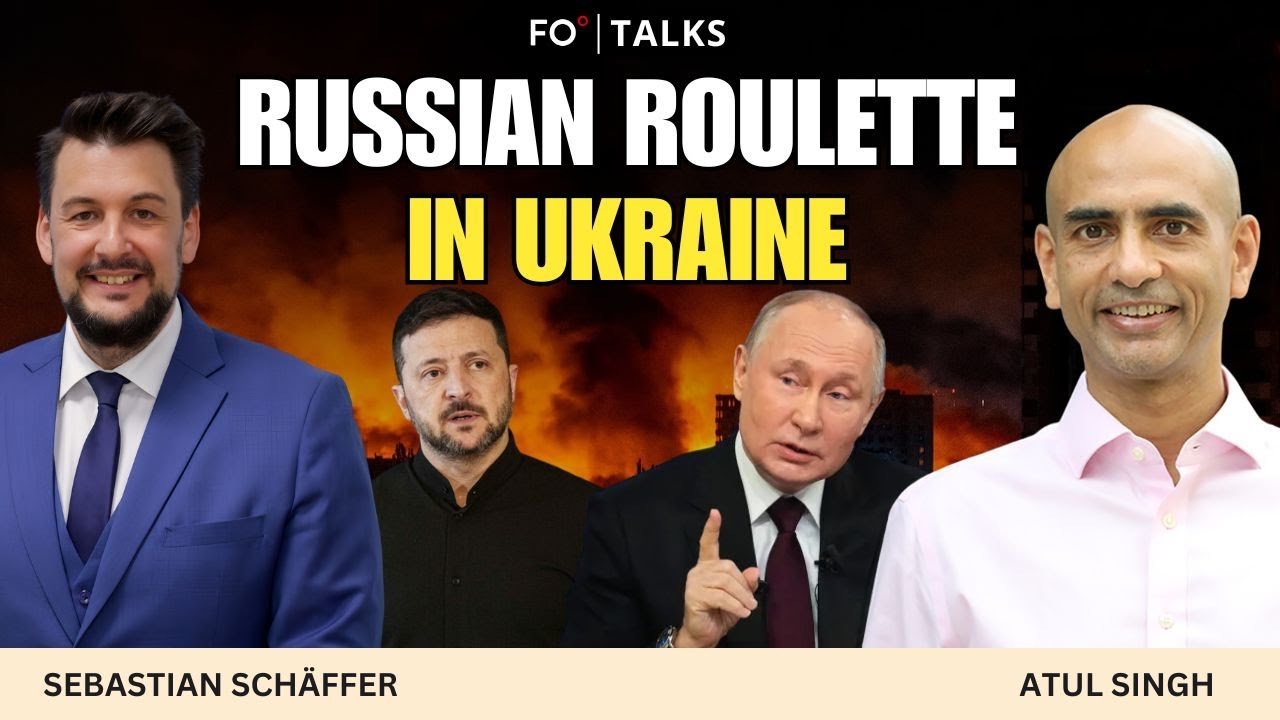
FO° Talks: Will France, Germany, Poland and UK Send Troops to Ukraine to Fight Russia?

Christopher Ford”
post_date=”August 13, 2025 06:18″
pUrl=”https://www.fairobserver.com/world-news/middle-east-news/fo-talks-us-western-allies-will-always-prevent-iran-from-making-the-nuclear-bomb/” pid=”157158″
post-content=”
Christopher Ford, the former Assistant Secretary of State for International Security and Nonproliferation, offers an insider’s view of efforts to stop the spread of nuclear weapons. He defines nonproliferation as the “set of policies, institutions and practices” designed to prevent more countries from acquiring these destructive arms. The United States has made this a top foreign policy priority for decades, aiming to keep nuclear weapons from spreading beyond existing holders.
The success of nuclear nonproliferation
Ford highlights the Nuclear Non-Proliferation Treaty (NPT), signed by 191 nations, which commits nuclear states not to assist others in obtaining weapons and binds non-nuclear states not to pursue them. The UN-affiliated International Atomic Energy Agency in Vienna, Austria, enforces these commitments through inspections, ensuring nuclear technology remains for peaceful purposes.
Libya is a success story: In 2003, Libyan leader Muammar Gaddafi abandoned his nuclear program after deciding it carried “enormous risks” and chose diplomacy over the costly, dangerous path of building a warhead.
Iran and the power of deterrence
Iran’s nuclear ambitions remain a key test. Exposed in August 2002, its program has been the focus of years of diplomatic effort to prevent weaponization, even as Iran continues to advance its capabilities. Ford sees “cautious optimism” after recent Israeli and US strikes on Iranian nuclear sites, calling such actions “the leading edge of nonproliferation policy.”
Ford concludes: “If the message of this current Iran thing is that if you try to pursue nuclear weapons in violation of the Nuclear Non-Proliferation Treaty, that you might well have American bunker buster bombs coming down on your underground tunnels. I mean, as a nonproliferation guy, I don’t mind that being the message.”
[Lee Thompson-Kolar edited this piece.]
The views expressed in this article/video are the author’s own and do not necessarily reflect Fair Observer’s editorial policy.
”
post-content-short=”
Christopher Ford, the former Assistant Secretary of State for International Security and Nonproliferation, offers an insider’s view of efforts to stop the spread of nuclear weapons. He defines nonproliferation as the “set of policies, institutions and practices” designed to prevent more…”
post_summery=”In this episode of FO° Talks, Christopher Ford, former US Assistant Secretary of State for International Security and Nonproliferation, explains the tools and challenges of stopping the spread of nuclear weapons. He highlights Libya’s disarmament as a success while assessing Iran’s contested program. Ford supports strong deterrence, including military action, against treaty violators.”
post-date=”Aug 13, 2025″
post-title=”FO° Talks: US, Western Allies Will Always Prevent Iran From Making the Nuclear Bomb” slug-data=”fo-talks-us-western-allies-will-always-prevent-iran-from-making-the-nuclear-bomb”>
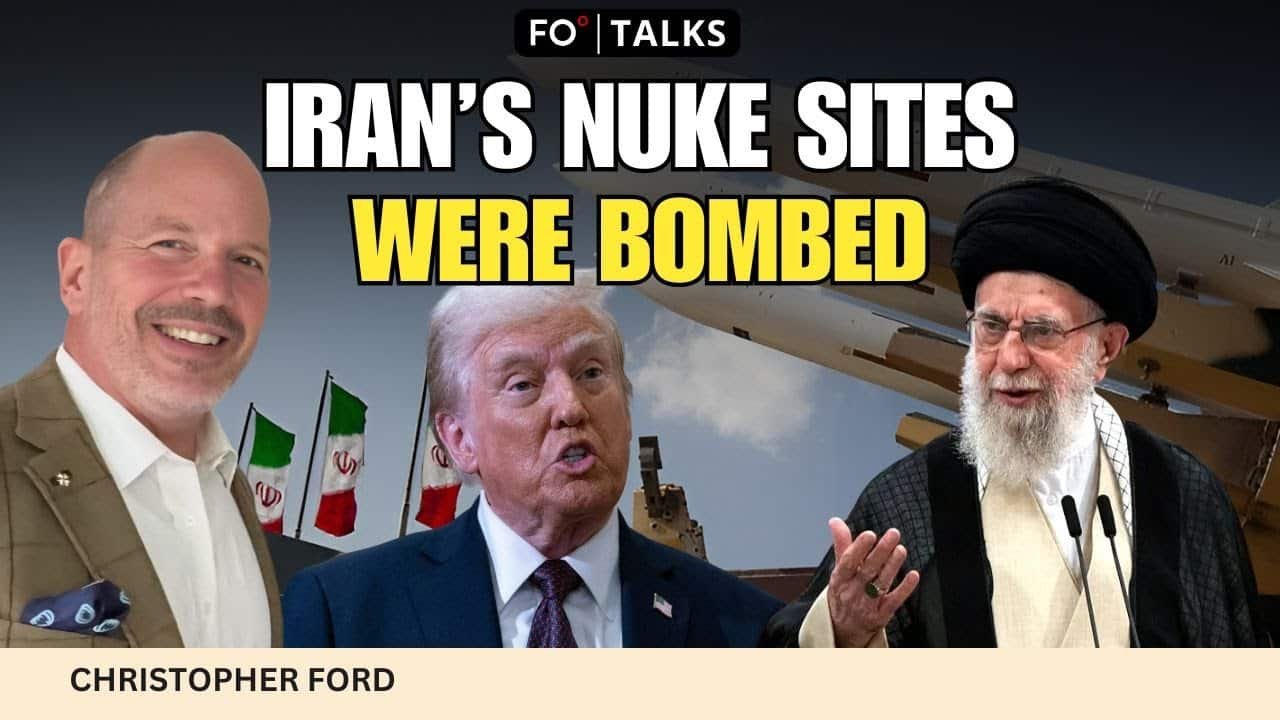
FO° Talks: US, Western Allies Will Always Prevent Iran From Making the Nuclear Bomb

Glenn Carle”
post_date=”August 12, 2025 06:43″
pUrl=”https://www.fairobserver.com/world-news/fo-exclusive-elon-musk-wants-to-take-on-republicans-and-democrats-with-america-party-can-he/” pid=”157142″
post-content=”
Fair Observer Founder, CEO & Editor-in-Chief Atul Singh and retired CIA Officer Glenn Carle discuss a variety of pressing issues that took place in July 2025. From American and European political drama to successes on Wall Street, they address the month’s notable international happenings.
Legislative drama in Washington
US President Donald Trump secured a major legislative victory with the passage of the One Big Beautiful Bill Act (OBBBA). The bill cleared the House of Representatives before heading to the Senate, where it passed by the slimmest margin possible — 51 to 50 — after Vice President JD Vance cast the deciding vote on July 1. Atul quips that while the 24-hour Senate session showed “stamina,” he could not offer equal praise for senators’s intellect. The bill then returned to the House, passing 218 to 214 largely along party lines on July 3.
Trump signed it into law on July 5, aligning its enactment with the July 4 Independence Day holiday. Atul describes the timing as “all jolly good cause for celebration,” sarcastically adding that “Trump gets to be emperor.”
Despite celebratory rhetoric from the administration, economists projected that the act would inflate the US deficit by $3.4 trillion over the next decade.
Elon Musk responds: outrage and a new political vision
Former Special Government Employee Elon Musk, already estranged from Trump, publicly condemned the OBBBA. He expressed outrage over its fiscal implications and questioned the point of having a debt ceiling if lawmakers repeatedly raise it.
Musk proposed the creation of a new political party to disrupt the dominance of both Republicans and Democrats. He pledged to finance primary challenges against any Republican who voted for the OBBBA, signaling the deepening divide between himself and Trump.
Paramount’s settlement and the CBS shake-up
American mass media and entertainment conglomerate Paramount Global agreed to pay $16 million to Trump’s future presidential library as part of a legal settlement over a lawsuit involving CBS News. Atul dryly comments on the payout: “How wonderful.”
Simultaneously, CBS canceled The Late Show With Stephen Colbert. Known for his sharp critiques of Trump, comedian Stephen Colbert had become, in Atul’s words, “inconvenient” to keep employed.
Trump had previously approved Paramount’s $8 billion merger with American entertainment company Skydance Media, raising eyebrows. Atul questions whether the $16 million payment was “an act of goodwill for the great leader” or simply “protection money to capo dei capi [Italian: ‘boss of the bosses;’ mafia leader],” suggesting deeper transactional politics at play.
Wall Street booms amid budget woes
Despite deficit concerns and political turbulence, the US stock market soared. The S&P 500 hit a record high, appearing unfazed by trade tensions.
American technology company Nvidia became the world’s first $4 trillion company — its value has surpassed India’s $3.5 trillion GDP. American computer and apparel corporations Oracle and Nike, respectively, also saw major gains. Atul sums up the financial landscape by stating the market was “performing swimmingly well.”
Economic turbulence and policy shifts abroad
In Great Britain, UK Prime Minister Keir Starmer refused to support Chancellor of the Exchequer Rachel Reeves on controversial welfare reforms. Reeves broke down crying in Parliament, and the political drama caused British bonds to plummet.
Meanwhile, French Prime Minister François Bayrou declared France “addicted to public spending” and announced a spending freeze. Additionally, he unveiled sweeping cuts, including benefit reductions, a new solidarity tax on the wealthy and even proposals to eliminate public holidays like Easter Monday and Victory in Europe Day. Atul predicts major public protests against this move.
In South America, Jeannette Jara won the Chilean left’s presidential primary, becoming the first communist candidate since the 1973 CIA-backed coup against former President Salvador Allende. Atul sardonically comments, “For all the efforts of the CIA in 1973, you’re still left with the challenge of communism.” Glenn humorously responds, “It was part of the plan.”
Other headlines from around the world
Atul concludes this segment of FO° Exclusive by quickly running through other noteworthy events. Gang violence in Haiti claimed over 3,000 lives in a worsening humanitarian crisis. Australia banned teenagers from accessing the video-sharing platform, YouTube, marking a sharp move in digital regulation. Just as Atul and Glenn prepared to broadcast this episode, Trump announced 25% tariffs and additional import taxes on Indian goods. The administration linked the move to India’s continued purchase of Russian oil.
[Lee Thompson-Kolar edited this piece.]
The views expressed in this article/video are the author’s own and do not necessarily reflect Fair Observer’s editorial policy.
”
post-content-short=”
Fair Observer Founder, CEO & Editor-in-Chief Atul Singh and retired CIA Officer Glenn Carle discuss a variety of pressing issues that took place in July 2025. From American and European political drama to successes on Wall Street, they address the month’s notable international…”
post_summery=”In FO° Exclusive’s July 2025 episode, US President Donald Trump signed the One Big Beautiful Bill Act into law, prompting concerns over its $3.4 trillion fiscal impact. Elon Musk opposed the bill, calling for a new political party. US markets soared, media dynamics shifted and global events — from UK welfare chaos to an Australian YouTube ban for teenagers — added to the drama.”
post-date=”Aug 12, 2025″
post-title=”FO° Exclusive: Elon Musk Wants to Take On Republicans and Democrats With America Party, Can He?” slug-data=”fo-exclusive-elon-musk-wants-to-take-on-republicans-and-democrats-with-america-party-can-he”>
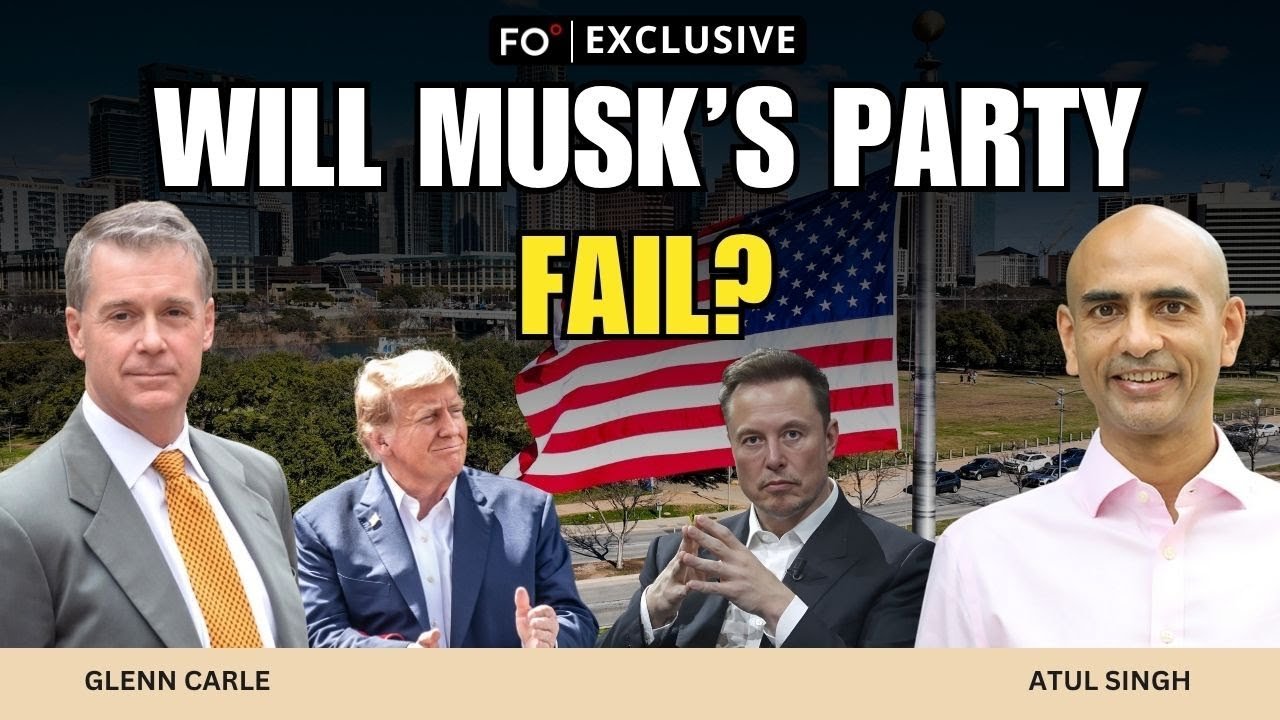
FO° Exclusive: Elon Musk Wants to Take On Republicans and Democrats With America Party, Can He?

Glenn Carle”
post_date=”August 11, 2025 07:39″
pUrl=”https://www.fairobserver.com/world-news/fo-exclusive-poland-nationalist-nawrocki-sworn-in-as-russia-ukraine-war-rages-on/” pid=”157133″
post-content=”
June was an eventful month in 2025. Fair Observer Founder, CEO & Editor-in-Chief Atul Singh and retired CIA Officer Glenn Carle look back at the key developments, from the US budget stalling in the Senate to a Boeing plane crashing in India. They then announce the two main topics of this episode of FO° Exclusive: the intensifying confrontation involving Iran, Israel and the United States, and the ongoing breakdown of US political and cultural norms.
US budget gridlock and domestic crisis
The US budget is at an impasse. While May brought economic uncertainty, the current situation has worsened. The federal budget remains stuck in the Senate, and a debt crisis now brews. This stalemate adds to the perception of dysfunction in Washington, DC, with fiscal paralysis threatening broader economic stability at home and abroad.
Ukraine’s deep strike into Russia
A dramatic escalation in the Ukraine conflict made global headlines. Ukrainian forces reportedly smuggled 117 drones deep into Russian territory — reaching as far as Eastern Siberia — and struck multiple airfields. According to the program, the operation damaged 41 Russian aircraft, including strategic bombers. Atul likens this unprecedented strike to the covert missions of the United Kingdom’s Special Air Service during World War II. Russia responded with retaliatory airstrikes on Ukrainian territory, further intensifying the war and underscoring Ukraine’s growing reach and resolve.
Poland’s presidential election and political clash
In a closely contested runoff, Karol Nawrocki of the right-wing Law and Justice Party defeated government-backed centrist Rafał Trzaskowski with 50.9% of the vote. The result introduces serious friction into Poland’s government, which operates under a parliamentary system with a separately elected president. Prime Minister Donald Tusk, a centrist, must now navigate governing alongside a hard-right president from a hostile political camp.
Atul explains that Poland is a very young democracy, having only shed communist rule in 1991. Political divisions within Poland mirror broader ideological splits across the West.
Europe’s spending crisis and NATO commitments
Across Europe, signs of economic and political strain mount. The UK reversed several policy commitments and announced new spending cuts, signaling deeper fiscal retrenchment. Meanwhile, NATO member states have reportedly agreed to increase their defense spending to 5% of GDP by 2035 — caving, as Atul puts it, to US President Donald Trump’s demands.
Atul questions the feasibility of this pledge, given the already high debt levels in many of these countries. He suggests that the resulting budget pressures could lead to reduced social services, diminished support for immigrants, and higher taxes, particularly for middle-income earners.
Colombian assassination attempt
A shocking incident occurred in Colombia, where an unseen attacker shot conservative senator and presidential candidate Miguel Uribe Turbay in the head. The senator survived, however. This assassination attempt underscored the country’s volatile political climate and ongoing security concerns. The hit on Urbe Turbe added to a growing list of violent political episodes in Latin America in recent years.
Deadly plane crash in India and regulatory failures
A tragic aviation disaster struck India when a Boeing plane crashed shortly after departing from Ahmedabad airport. The craft failed to properly take off, gradually descending and hitting several buildings. The crash killed not only the hundreds of passengers but also civilians in those buildings. Preliminary investigations pointed to an electrical failure as the cause.
Atul criticizes Boeing for the plane’s technical issues while Glenn blames the crew who maintained the craft. Public criticism quickly focused on the Indian Director General of Civil Aviation, Faiz Ahmed Kidwai, who was formerly in charge of farmer welfare.
The incident reignited broader concerns about the Indian Administrative Service, which routinely places generalist bureaucrats into technical leadership roles. This practice raises serious questions about domain expertise and regulatory competence.
Vietnam’s partial repeal of the death penalty
Amid the grim headlines, Vietnam made a notable reform by eliminating the death penalty for eight crimes, including embezzlement. Atul views this move as a step in the right direction for human rights, although Glenn opines that it might have been partially self-serving — intended to shield government officials from harsh legal consequences. Nevertheless, the decision was recognized as a progressive shift within Southeast Asia.
Trump and Musk’s public falling out
Trump and former Special Government Employee Elon Musk experienced what Atul describes as a “spectacular falling out,” attracting widespread public attention. The dispute reflects the fracturing alliances among powerful conservative and libertarian figures. It also reinforces the blending of politics and celebrity culture in contemporary media.
Nippon Steel’s takeover of US Steel
In a major economic development, Trump approved Japanese steelmaker Nippon Steel’s acquisition of American steel manufacturer US Steel. The move was framed as a diplomatic win for Japan and a sign of strengthening economic ties between the US and Japan. It also signaled a potential shift in Republican trade posture, showing a willingness to allow foreign takeovers under certain geopolitical circumstances.
[Lee Thompson-Kolar edited this piece.]
The views expressed in this article/video are the author’s own and do not necessarily reflect Fair Observer’s editorial policy.
”
post-content-short=”
June was an eventful month in 2025. Fair Observer Founder, CEO & Editor-in-Chief Atul Singh and retired CIA Officer Glenn Carle look back at the key developments, from the US budget stalling in the Senate to a Boeing plane crashing in India. They then announce the two main topics of this…”
post_summery=”To begin the June 2025 episode of FO° Exclusive, Atul and Glenn cover a month marked by heightened geopolitical tension, domestic political dysfunction and terrible tragedies. Highlights include Ukraine’s deep drone strike into Russia, Poland’s hard-right presidential victory and Europe’s economic tightening amid NATO spending pledges. Meanwhile, a fatal plane crash in India and an assassination attempt in Colombia underscore systemic governance issues.”
post-date=”Aug 11, 2025″
post-title=”FO° Exclusive: Poland: Nationalist Nawrocki Sworn-in as Russia–Ukraine War Rages On” slug-data=”fo-exclusive-poland-nationalist-nawrocki-sworn-in-as-russia-ukraine-war-rages-on”>
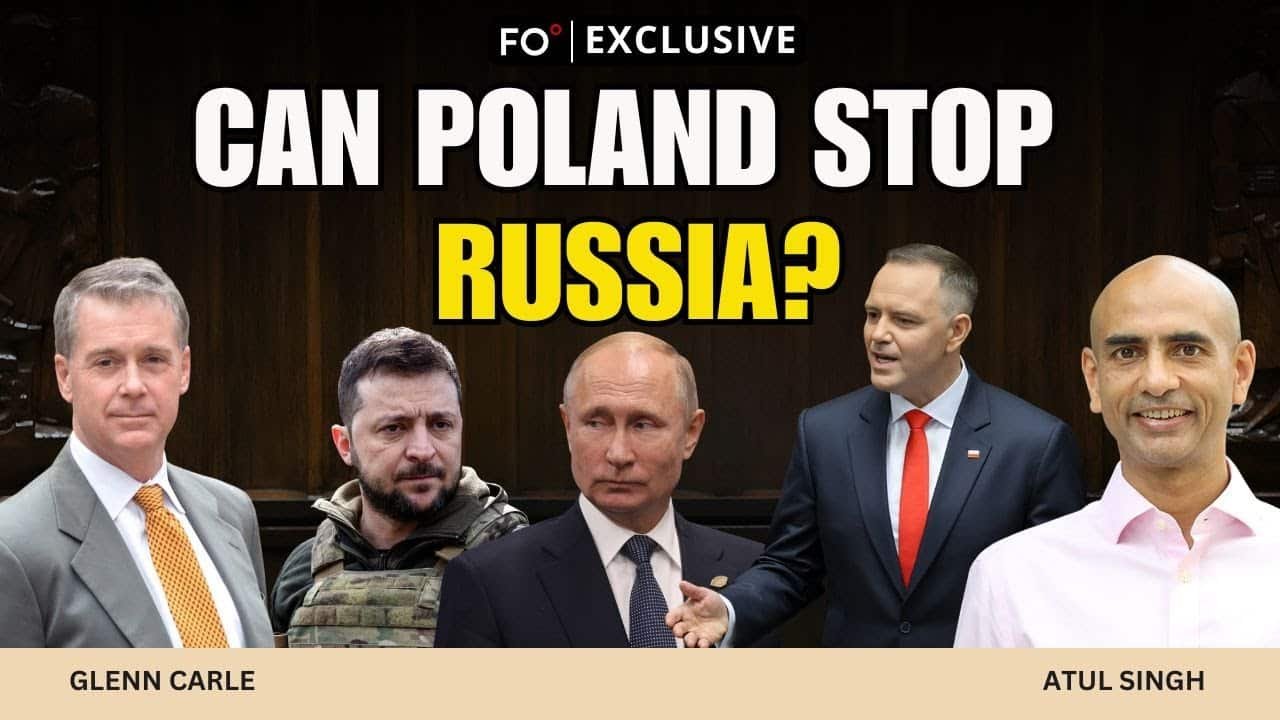
FO° Exclusive: Poland: Nationalist Nawrocki Sworn-in as Russia–Ukraine War Rages On

Jason Ward”
post_date=”August 05, 2025 07:13″
pUrl=”https://www.fairobserver.com/business/fo-talks-do-google-microsoft-starbucks-make-billions-of-dollars-by-avoiding-taxes/” pid=”157072″
post-content=”
Fair Observer Founder, CEO & Editor-in-Chief Atul Singh and Jason Ward, founder and principal analyst at the Center for International Corporate Tax Accountability and Research (CICTAR), discuss how multinational corporations shift profits to avoid taxes, and the resulting consequences for governments, markets and public services. Ward emphasizes that these avoidance schemes are not sophisticated — they’re “simple tricks” that deprive countries of revenue needed for infrastructure, health, education and legal systems. As a result, essential public goods are underfunded while inequality deepens. This hollowing out of national budgets affects not just developing countries but also wealthy ones, limiting their capacity to respond to crises, invest in the future or compete economically.
Microsoft and Ireland: windfall gains from past loopholes
Ward highlights the technology titan Microsoft as a central case study, pointing to a nearly $30 billion audit by the Internal Revenue Service — the largest of its kind. Historically, Microsoft routed massive revenues through Ireland while paying very little tax, exploiting a now-defunct loophole where companies could claim tax residency in jurisdictions like Bermuda while operating legally in Ireland. This practice was widespread among US tech giants and made Ireland a magnet for profit-shifting activity.
But recent global tax reforms have shifted this dynamic. Ireland’s closure of schemes like the “double Irish Dutch sandwich” and its increase of the corporate tax rate from 12.5% to 15% — in response to the Organization for Economic Co-operation and Development (OECD)’s Pillar Two minimum tax agreement — now force companies like Microsoft to pay significantly more tax, even on revenue not generated in Ireland. These windfall revenues are helping Ireland establish a sovereign wealth fund, though Ward warns the gains may be short-lived; companies may adapt and reroute profits elsewhere once new workarounds are found.
Starbucks and Switzerland: fictional coffee trade
To illustrate another strategy, Ward discusses the coffee company Starbucks’s operations in Switzerland. Since 2011, every green coffee bean Starbucks purchases is, on paper, bought and resold through its Swiss subsidiary, Starbucks Coffee Trading Company SRL, with an 18% markup. This markup, taxed at low Swiss rates, shifted an estimated $1.3 billion in profit from consumer markets like the United States and China to Switzerland. The trade is “purely fictional” — the beans never physically enter Switzerland. The entire transaction is constructed on paper, allowing Starbucks to reap massive tax advantages while governments in actual sales markets lose out.
This “very clever accounting trick” is widespread in global commodities and results in the systematic extraction of tax revenues, even from some of the world’s poorest countries. Global commodity hubs like Switzerland are designed to provide such fiscal advantages to corporations, making them complicit in the erosion of global tax bases.
Uber and the Netherlands: IP and artificial debt
Ward turns to the transportation service Uber to demonstrate how companies use intellectual property and debt structures to shelter profits. Uber, which defines itself as a tech company, directs global customer payments to a Dutch entity, returning only the driver’s share. After shifting its intellectual property (IP) from Bermuda to the Netherlands through a fictional transaction, Uber created large volumes of internal debt, allowing it to minimize its tax obligations. The Dutch entity essentially “buys” the IP, creating debt on its books, which can then be used to write off future profits as interest payments.
Uber has processed more financial flows through the Netherlands than even JPMorgan Chase Bank. Similar tactics are used by other firms, namely the online streaming company Netflix and the fast food titan McDonald’s. Particularly, companies in IT and pharmaceuticals can easily manipulate the location and value of IP assets. These industries are ideal for profit shifting because their key value drivers — algorithms, branding or molecular formulas — are intangible and easy to relocate on paper.
Big Pharma: public subsidies, private gains
Ward scrutinizes pharmaceutical companies like Merck and Pfizer for benefiting heavily from public spending and subsidies while reporting minimal tax liability. By housing patents in low-tax jurisdictions like Ireland, Switzerland or Bermuda, these firms book profits in favorable locations while avoiding tax in the high-revenue US market. Despite massive public subsidies for research and development and government drug purchases, Merck, for instance, reported a global profit of $20 billion but a US loss of $1.8 billion — effectively paying no tax domestically. The Senate Finance Committee and even US President Donald Trump have scrutinized this practice.
Ward also cites biotech company CSL, which claimed its Swiss workforce generated ten times the profit of its Australian employees. This shocking statistic raised eyebrows during debates over new tax transparency laws.
The pattern across Big Pharma is clear: Governments fund the science and purchase the drugs, while the companies siphon profits offshore. This double-dipping — benefiting from public support while dodging tax — undermines both fiscal responsibility and public trust.
Transparency and reform: global efforts gain traction
Ward outlines reform efforts aimed at halting the global “race to the bottom.” Australia has passed groundbreaking tax transparency laws requiring multinationals to disclose key financial data — revenues, profits, taxes paid and employee numbers — in known tax havens. This initiative, though not exhaustive, sets a new global benchmark. It also builds on Australia’s ten-year push for public accountability, driven by citizen awareness campaigns and investigative journalism.
CICTAR has also filed shareholder resolutions demanding country-by-country reporting, including one at Merck that received 23% support despite opposition from management and proxy advisors. The European Union has implemented a similar framework, though with more loopholes and limited jurisdictional reach.
These reforms represent a growing consensus that transparency is essential for meaningful enforcement. Without it, governments remain blind to how much revenue is being lost and where.
Toward a fairer global system
Fortunately, tax laws are seeing several hopeful developments. The US Financial Accounting Standards Board (FASB) is pushing for greater corporate tax disclosure. China is also taking a harder stance on tax avoidance, including by multinationals. This change potentially positions the country as a constructive player in global reform.
The momentum for global tax coordination is shifting from the OECD — a body Ward criticizes as favoring wealthy nations — to the more democratic United Nations. Although UN processes are slower and messier, they offer more space for regional cooperation and developing-country influence. This shift could be transformative if emerging economies work together to demand fairer treatment and tighter standards. Ward acknowledges the institutional challenges within the UN but believes its legitimacy and broader participation make it a more just venue for negotiating rules that affect all nations, not just the most powerful.
He remains skeptical about the future of OECD’s Pillar One plan, which targets large tech firms like Google and Microsoft. He notes that unilateral digital services taxes initially created enough pressure for companies to seek multilateral solutions. But if Pillar One fails in the US Congress, those unilateral measures may return. He warns that Trump’s approach of defending the US corporations’ ability to dodge taxes is short-sighted and undermines US tax revenue. This stance weakens the global tax system and deprives Americans of the revenue needed to fund critical services and infrastructure.
The case for transparency and fairness
Ward insists that transparency is primarily about competitiveness and innovation. Companies should succeed by offering better products, services and ideas, not by exploiting tax loopholes. Dominant firms that avoid taxes distort competition and entrench monopoly power, while smaller businesses are left at a disadvantage.
For investors, unions and citizens alike, robust transparency is key to building smarter markets and healthier economies. A more accountable tax system is essential to creating a fairer global order. Tax justice is not a fringe concern — it’s a foundational issue for economic development, democratic governance and global equity.
[Lee Thompson-Kolar edited this piece.]
The views expressed in this article/video are the author’s own and do not necessarily reflect Fair Observer’s editorial policy.
”
post-content-short=”
Fair Observer Founder, CEO & Editor-in-Chief Atul Singh and Jason Ward, founder and principal analyst at the Center for International Corporate Tax Accountability and Research (CICTAR), discuss how multinational corporations shift profits to avoid taxes, and the resulting consequences for…”
post_summery=”In this episode of FO° Talks, CICTAR Founder Jason Ward explains how multinational corporations exploit legal loopholes to shift profits and avoid taxes, depriving countries of vital public revenue. He emphasizes the urgent need for transparency and reform. With growing global momentum, only robust disclosure and democratic coordination can restore fairness and competition in global markets.”
post-date=”Aug 05, 2025″
post-title=”FO° Talks: Do Google, Microsoft, Starbucks Make Billions of Dollars by Avoiding Taxes?” slug-data=”fo-talks-do-google-microsoft-starbucks-make-billions-of-dollars-by-avoiding-taxes”>
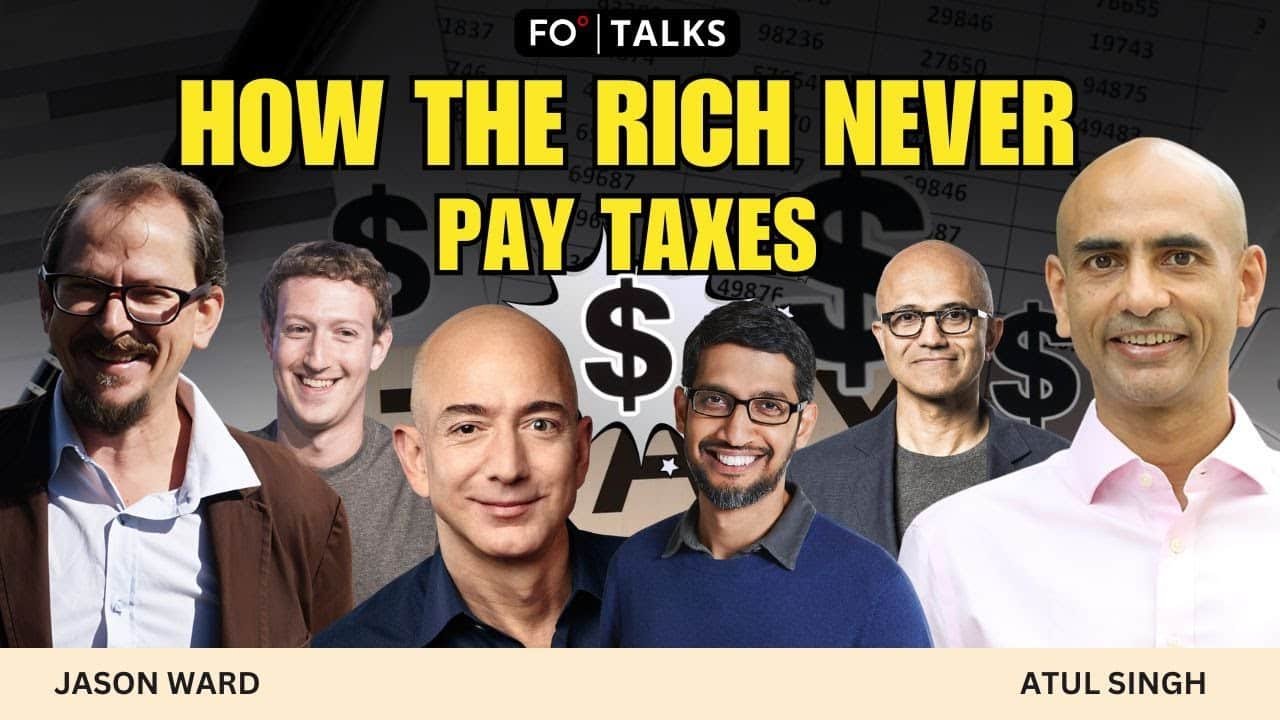
FO° Talks: Do Google, Microsoft, Starbucks Make Billions of Dollars by Avoiding Taxes?

AK Singh”
post_date=”August 04, 2025 07:37″
pUrl=”https://www.fairobserver.com/region/central_south_asia/fo-talks-an-indian-military-mind-on-ukraines-remarkable-kursk-invasion/” pid=”157050″
post-content=”
This conversation between Fair Observer Chief Strategy Officer Peter Isackson and retired General AK Singh, a seasoned Indian military commander with deep ties to Soviet, NATO and Russian commands, offers a wide-ranging strategic assessment of the Ukraine conflict. Singh’s insights explore not only the war’s military dimensions but also its geopolitical roots, global ripple effects and what it reveals about shifting power structures.
A war that “should not have been”
Singh opens with the assertion that the Ukraine war was avoidable. He blames “international centers of compellence” — namely, US neoconservatives and a compliant EU/NATO bloc on one side, and Russia on the other. Ukraine, he argues, is the real victim: a “means” caught in the middle and devastated. He criticizes Western media for shaping public perception and pressuring social media platforms to take sides. He questions the West’s moral consistency, citing the unequal outrage over civilian deaths in Ukraine versus Palestine, Afghanistan, Syria or Libya.
In terms of economic warfare, Singh calls sanctions a “double-edged” tool that is ineffective against Russia’s resilient “fortress economy.” He points out that India has drawn lessons from the conflict, bolstering its defense self-reliance and maintaining a pragmatic foreign policy. Isackson agrees that the war could have been avoided and faults Western media for ignoring the historical buildup.
Red lines and long-range risks
The discussion turns to a crucial question: Should the West authorize long-range strikes into Russian territory? Isackson asks what this would mean for the war. Singh calls it a “critical juncture.” European countries may support the move, but the US remains cautious due to Russia’s vast nuclear arsenal and doctrine that allows using “all means” if the state is threatened. He warns that such attacks could corner Russia, potentially triggering a drastic response. Still, he expresses hope that cooler heads will prevail.
Politics and the path to escalation
Isackson raises the role of US politics in shaping the war’s trajectory, especially in the face of the US’s 2024 elections. He suggests efforts may be underway to prolong the conflict until November. Singh agrees, calling the presidential election an “overbearing influence.” He notes internal US divisions, with the Pentagon and Department of Defense reportedly opposed to escalation, while the State Department and intelligence agencies push for it. He expresses concern over CIA Director William Burns’s support for risky decisions, despite his understanding of Russian red lines.
Singh emphasizes that Ukraine’s fate is tethered to US decisions, not Ukrainian President Volodymyr Zelenskyy’s leadership, which he calls “delusion” in the eyes of the Global South. He doubts the strategic value of delivering F-16 fighter aircraft or launching operations like the Kursk incursion, asserting that “everybody understands that Russia cannot be defeated.” The key question is how much Russia will gain — especially securing Ukraine’s Donbas region and halting NATO expansion — before the war ends.
Propaganda, publics and power
Isackson challenges the disconnect between Singh’s assessment and official Western rhetoric that insists on Ukrainian victory. Singh points to internal Russian unity, comparing current public support for Putin to wartime solidarity in World War II. He urges the West to stop chasing illusions and instead pursue backchannel diplomacy — especially between the US and Russia. He criticizes Western narratives that paint negotiation as “appeasement,” stifling chances for real peace.
Singh stresses that basic trust between Russia and the US has eroded. Citing retired German Chancellor Angela Merkel’s remarks that the Minsk Accords merely “bought time,” he argues Russia will not fall for such tricks again. He anticipates a turning point within months, as Ukraine’s capacity to sustain the war continues to weaken.
Kursk: tactical gain, strategic mistake
Isackson and Singh sharply analyze the Kursk operation. Singh doubts Ukraine could have launched it without Western backing. Though Ukraine gained territory, he sees no strategic benefit. With no coherent defensive line and mounting casualties, Ukraine faces a dire choice: entrench and risk losing supply lines, fall back to a shallower position or try to rescue troops from Donbas. He highlights the importance of the Ukrainian city of Pokrovsk as a logistical hub.
Isackson mentions that Western officials justify Kursk as a “morale boost,” but Singh sees it as a mistake without a defined “end state.” He contrasts MI6’s more cautious tone with Burns’s more hawkish stance. While the US offers rhetorical support, he argues that Ukraine bears the actual costs — “half a million dead,” mass displacement and destruction — while the US risks little.
Regime change fantasies and geopolitical blindness
Talk of regime change in Russia is brushed aside. Singh sees strong support for Putin and no viable challengers. Isackson compares this to Vietnam, where the US prolonged an unwinnable war. Singh says the US elite isn’t being honest with the public and that sanctions have failed to hurt the average Russian. He laments a lost opportunity for post-Cold War reconciliation with Russia, which instead “was poked” into closer Chinese ties.
He argues that US foreign policy is captive to the military-industrial complex, which profits from prolonged conflict. He contrasts this with India’s emphasis on peace and diplomatic flexibility. Drawing on his experience with both Soviet and NATO forces, Singh finds it surprising that so few retired US military officials publicly challenge prevailing policy.
The rise of BRICS and a multipolar order
Isackson brings up BRICS and its growing appeal. Singh says the Global South no longer wants to be pulled into superpower rivalries. BRICS, representing a large share of the global population and GDP, offers an alternative where their interests are better safeguarded. He predicts that US unilateralism will recede and sanctions will push countries toward a new parallel economic system.
India’s decision to buy Russian oil is cited as pragmatic and in its national interest. Isackson notes BRICS’s challenge to the dominance of the US dollar. Singh adds that the outdated structure of institutions like the UN Security Council must change. It’s “scandalous,” he says, that India still lacks a permanent seat.
A final warning: eyes on the Middle East
In closing, Singh argues that Ukraine is unlikely to cause a global catastrophe, but the Middle East might. He warns that one incident involving Israel and surrounding powers could escalate uncontrollably. Isackson says that today’s youth seem desensitized to nuclear threats — unlike his generation, which was shaped by events like the Cuban Missile Crisis.
Singh praises Hungarian Prime Minister Viktor Orbán for bluntly acknowledging the risks and criticizes other European leaders for underestimating the dangers. Isackson agrees and sees leaders like Israeli Prime Minister Benjamin Netanyahu as more volatile than Zelenskyy. He warns that both are trying to draw the US deeper into their wars.
Singh closes by noting Putin’s restraint — seen by some as fear, but which he views as a deliberate effort to avoid crossing a dangerous line. Isackson recalls that Putin once proposed a security framework to avoid war, which the West has largely ignored.
[Lee Thompson-Kolar edited this piece.]
The views expressed in this article/video are the author’s own and do not necessarily reflect Fair Observer’s editorial policy.
”
post-content-short=”
This conversation between Fair Observer Chief Strategy Officer Peter Isackson and retired General AK Singh, a seasoned Indian military commander with deep ties to Soviet, NATO and Russian commands, offers a wide-ranging strategic assessment of the Ukraine conflict. Singh’s insights explore not…”
post_summery=”In this episode of FO° Talks, Fair Observer Chief Strategy Officer Peter Isackson and retired Indian General AK Singh hold a critical assessment of the Ukraine war, arguing it was shaped by Western strategic missteps and media narratives. Singh warns that escalation risks provoking a Russian response, and questions the effectiveness of US policy and the credibility of Ukraine’s leadership. The speakers also explore shifting global power dynamics and emphasize the need for diplomacy to prevent wider catastrophe.”
post-date=”Aug 04, 2025″
post-title=”FO° Talks: An Indian Military Mind on Ukraine’s Remarkable Kursk Invasion” slug-data=”fo-talks-an-indian-military-mind-on-ukraines-remarkable-kursk-invasion”>
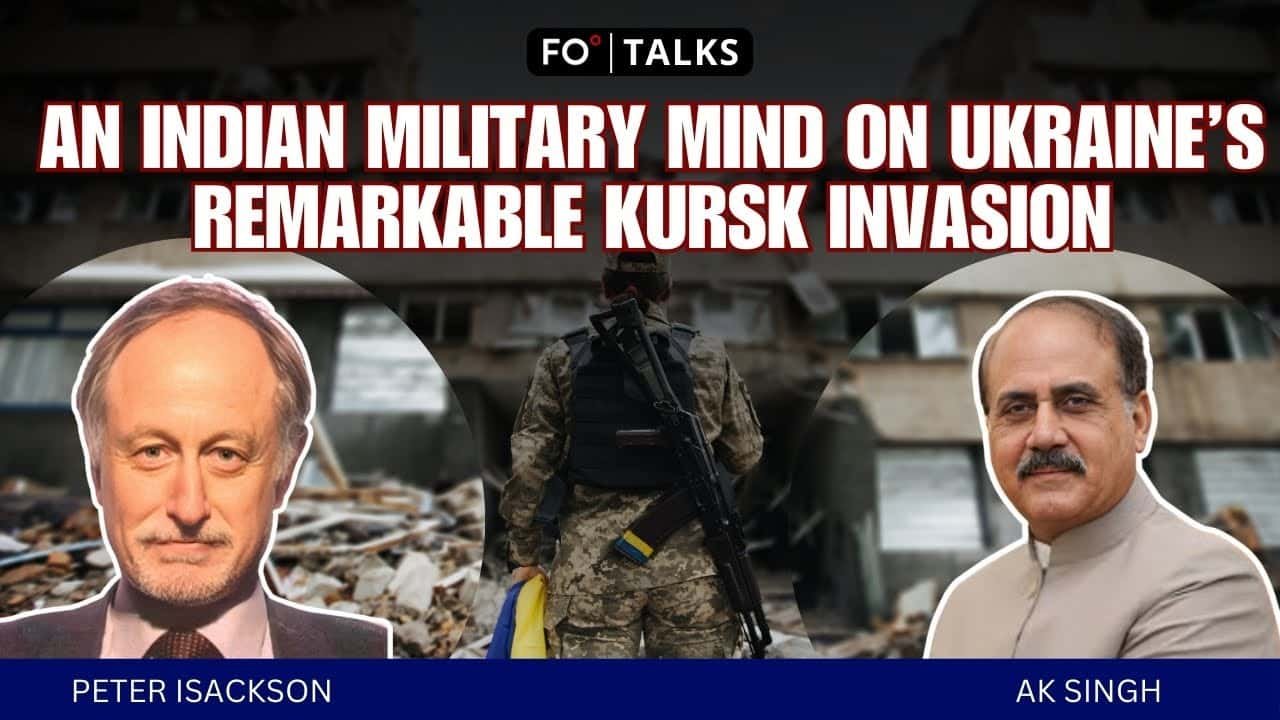
FO° Talks: An Indian Military Mind on Ukraine’s Remarkable Kursk Invasion

Glenn Carle”
post_date=”August 02, 2025 07:01″
pUrl=”https://www.fairobserver.com/politics/fo-exclusive-trump-attacks-harvard-as-ice-raids-continue-in-los-angeles/” pid=”157036″
post-content=”
Fair Observer Founder, CEO & Editor-in-Chief Atul Singh and retired CIA Officer Glenn Carle open this section of their discussion with signs of American institutional decline: a muted presidential parade, unrest in Los Angeles and a growing perception that the United States now mirrors unstable developing nations. Atul laments the collapse of the principles that once defined America — rule of law, stable institutions and merit-based leadership. He warns that ideological extremism has replaced civic norms, with “totalitarians on the left and authoritarians on the right” dominating discourse and weakening the national center.
A focal point of this erosion is Harvard University, long a symbol of American soft power. Atul states that a legal battle now prevents the university, with its $53 billion endowment and large population of elite foreign students, from admitting any more international students. He sees this as part of a broader crackdown, including a sweeping immigration campaign that Donald Trump has pushed. Under this campaign, Immigration and Customs Enforcement (ICE) carries out what is described as the largest mass deportation program in US history. It regularly ignores due process and answers protests with military deployments — a rare escalation in US domestic affairs.
Revolutionary shifts in governance and power
Glenn contextualizes these developments as more than political turbulence. They are, in his view, signs of a systemic revolution. He argues the US faces its most profound crisis since 1861, but unlike the American Civil War, today’s upheaval directly targets foundational institutions. At the heart of this shift are two radical ideological projects: Project 2025, which seeks to shrink the federal government to just border control and defense, and the theory of the unitary executive, which would grant the president unchecked authority, modeled after authoritarian regimes like China’s.
Glenn calls the theory “literally revolutionary in intent” and traces its intellectual roots to Carl Schmitt, a legal philosopher who served Adolf Hitler’s Nazi regime during World War II. These ideas, he warns, are not theoretical — they’re being translated into policy. The federal deployment of Marines and National Guard troops to California, despite no declared emergency, marks a dangerous centralization of military authority. These actions represent to Glenn a conscious attack on the current American order, aiming to reshape governance, dismantle the post-New Deal consensus and exclude multicultural voices from cultural and political power.
Cultural crisis, social fragmentation and the decline of discourse
Atul and Glenn identify cultural and economic undercurrents fueling this crisis. Atul acknowledges that elite institutions like Harvard are not above criticism — he condemns their chilling effect on speech and the regulatory capture that shields large corporations. But he insists that these problems stem from deeper societal fault lines: a gutted working class, a crisis of affordability in education and housing and a collapsing media ecosystem. The ratio of journalists to public relations professionals has gone from 1:2 in 1998 to 1:10 today, turning political debate into constant spin and leaving voters uninformed.
Glenn underscores the racial and cultural dimensions of this upheaval. He describes a white male elite unwilling to accept the demographic and cultural evolution of America, lashing out to preserve dominance. Harvard, in this context, becomes a symbolic enemy — a stand-in for everything multicultural, intellectual and global. The result, he warns, is a paradigm shift in what is considered normal or acceptable in American society. Glenn reflects on French political philosopher Alexis de Tocqueville’s warning: When every voice carries equal weight but lacks authority or knowledge, democracy devolves into chaos and the tyranny of the majority takes hold.
[Lee Thompson-Kolar edited this piece.]
The views expressed in this article/video are the author’s own and do not necessarily reflect Fair Observer’s editorial policy.
”
post-content-short=”
Fair Observer Founder, CEO & Editor-in-Chief Atul Singh and retired CIA Officer Glenn Carle open this section of their discussion with signs of American institutional decline: a muted presidential parade, unrest in Los Angeles and a growing perception that the United States now mirrors…”
post_summery=”In this episode of FO° Exclusive, Fair Observer Founder, CEO & Editor-in-Chief Atul Singh and retired CIA Officer Glenn Carle examine the collapse of US political norms, focusing on legal and cultural assaults on immigration law and institutions like Harvard University. They trace these events to deeper ideological efforts to reshape American governance and society. The result, they argue, is a systemic crisis that challenges democracy itself.”
post-date=”Aug 02, 2025″
post-title=”FO° Exclusive: Trump Attacks Harvard as ICE Raids Continue in Los Angeles” slug-data=”fo-exclusive-trump-attacks-harvard-as-ice-raids-continue-in-los-angeles”>
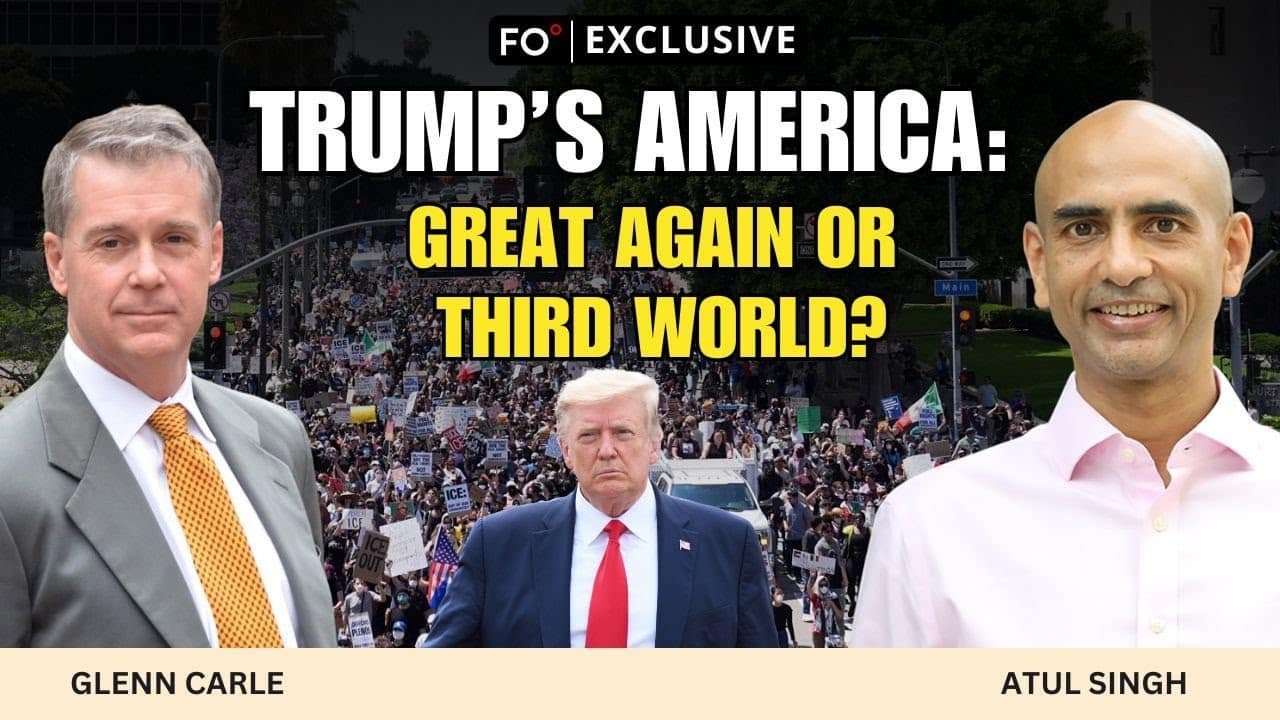
FO° Exclusive: Trump Attacks Harvard as ICE Raids Continue in Los Angeles

Viral Acharya”
post_date=”July 17, 2025 06:57″
pUrl=”https://www.fairobserver.com/video/fo-talks-why-is-indias-economy-slowing-down/” pid=”156838″
post-content=”
Founder, CEO and Editor-in-Chief Atul Singh interviews Professor Viral Acharya, the former Deputy Governor of the Reserve Bank of India (RBI), about why India’s economic growth has slowed recently.
Part of the slowdown stems from a correction following the post-COVID economic bounce. After the pandemic, pent-up demand surged, and monetary and fiscal stimulus fueled growth. Low interest rates lowered debt payments, and many state governments cut stamp duties. Equity and housing prices rose, making the wealthy feel very rich and boosting their consumption. Now, this demand has declined.
Reasons for the slowdown in growth
The post-COVID bounce rested on a narrow base. Both the informal and rural economies suffered. They were not as financially developed, and the wealth effect from monetary stimulus was weak. Furthermore, the rich did not spend what the poor in these sectors earned. This led to a K-shaped recovery, where different parts of the economy perform divergently, like the arms of the letter “K.”
Second, the savings glut among the wealthy is insufficient to drive the economy. Indian policymakers need to raise incomes for more people. The poor tend to, and want to, spend more. If they do not see higher incomes, the financial sector transfers money from the rich to the poor through unsecured consumer credit. This mirrors the growth of credit card debt in the US, which reached $1.17 trillion at the end of the third quarter in 2024, with an average interest rate of 23.37%.
The RBI has attempted to slow unsecured credit growth, but this alone cannot solve the core issue: how the government addresses the lack of real wage growth among the masses.
Over the last five years, agricultural job creation in India has been more than 50%, which is concerning because agriculture accounts for just over 15% of the country’s GDP and is a low-productivity sector. The states of Uttar Pradesh, Bihar and Bengal, in India’s hinterland, do not generate enough high-quality jobs. To improve this, the government must boost private investment by opening up the economy, creating demand for more productive labor and generating new jobs.
On the supply side, policymakers need to invest in education, health and vocational training so Indian workers can meet the increased demand from higher investment. India must shift away from low-quality, low-income jobs in agriculture that produce little demand, toward better opportunities that foster higher income and growth.
What should the Indian government do?
In policy terms, India needs to do two things. First, it must introduce another round of liberalization, which involves reducing protectionist barriers and lowering tariffs. Policy certainty for the next three to five years is crucial because businesses require predictability and confidence. India needs foreign businesses to establish operations in the country, as this facilitates technology transfers. These transfers, in turn, boost efficiency, increase productivity and enhance the economy’s competitiveness.
Today’s situation has improved since 1991, when the public sector was more dominant. Although the public sector remains inefficient, the industry’s concentration in a few hands is a concerning trend. While we are no longer in a pre-1991 world, reducing industry concentration remains a crucial priority.
Second, India should pursue growth that matches its high potential. Given the economy’s current low base, India should aim for higher growth rates.
What about the falling rupee and FIIs leaving the Indian market
The volatility of the rupee has been too low. While the RBI needs to maintain inflation credibility, it must also avoid excessive market interventions. Now, the RBI has loosened the strict management of the rupee’s volatility. As a result, the money that previously flowed in is now flowing out. Additionally, US markets are currently frothy, causing dollars to return to the US and exert downward pressure on both the rupee and Indian stock markets. In any case, Indian markets were also frothy and needed a sanity check.
[Kaitlyn Diana edited this piece]
The views expressed in this article/video are the author’s own and do not necessarily reflect Fair Observer’s editorial policy.
”
post-content-short=”
Founder, CEO and Editor-in-Chief Atul Singh interviews Professor Viral Acharya, the former Deputy Governor of the Reserve Bank of India (RBI), about why India’s economic growth has slowed recently.
Part of the slowdown stems from a correction following the post-COVID economic bounce….”
post_summery=”India’s economic growth is slowing down because the post-Covid bounce has run out of steam. The growth is based on a narrow economic base and the government needs another round of 1991-style liberalization to boost the economy.”
post-date=”Jul 17, 2025″
post-title=”FO° Talks: Why Is India’s Economy Slowing Down?” slug-data=”fo-talks-why-is-indias-economy-slowing-down”>
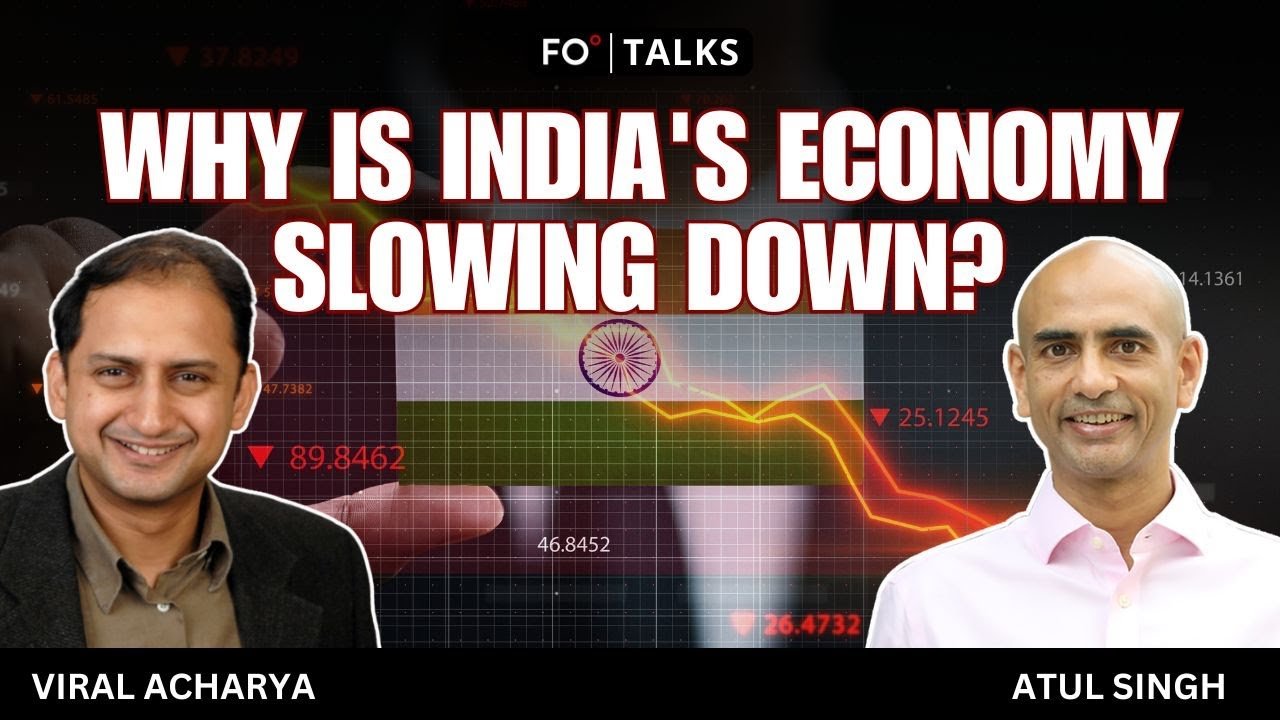
FO° Talks: Why Is India’s Economy Slowing Down?

Glenn Carle”
post_date=”July 13, 2025 05:51″
pUrl=”https://www.fairobserver.com/world-news/us-news/fo-talks-did-russia-recruit-donald-trump-as-a-spy-former-cia-officer-reveals/” pid=”156503″
post-content=”
Retired CIA officer Glenn Carle offers a provocative and deeply unsettling analysis of US President Donald Trump. He claims that Trump is what intelligence professionals would classify as a Russian asset, not a traditional spy who takes orders, but someone who has been cultivated and influenced over decades. He traces the beginnings of Trump’s relationship with Russian intelligence back to 1986, when Trump Tower caught the attention of Natalia Dubinin, the daughter of Russian Ambassador Yuri Dubinin. This, he says, eventually led to Moscow’s long-standing efforts to entice Trump with the idea of building a Trump Tower in Red Square.
How intelligence recruitment works
Carle explains that this type of influence operation involves spotting, assessing, developing and ultimately recruiting targets, often through subtle psychological manipulation. He describes how even small gestures, such as offering a favor, can establish bonds of loyalty or create a sense of indebtedness.
Trump, in Carle’s view, is especially susceptible due to his vanity and his consistent loyalty to those who flatter him. While Trump does not align with Russia on every issue — notably diverging on Iran — Carle notes he has parroted Russian state messaging and advanced Kremlin-aligned policies across many domains.
Domestic ideology and institutional erosion
Whitaker and Carle shift the conversation from foreign entanglements to the domestic sphere, where they see grave danger in the political movement surrounding Trump. Carle argues that Trump’s actions are part of a broader ideological push by elements of the Republican Party’s right wing to gut the federal government. This includes promoting the “unitary executive theory,” shrinking federal functions to defense and border control, and dismantling institutions built since the New Deal. These ideas, according to Carle, come not from Trump himself but from his inner circle and movement intellectuals.
The crisis of American democracy
Carle concludes with a stark warning: The United States is undergoing its deepest institutional crisis since the Civil War. Unlike the societal unrest of the 1960s, he believes the current moment poses a threat to the core structures of American governance. He cites attacks on the First Amendment and on the free media, reduction of social services programs, efforts to centralize military command and widespread distrust in democratic institutions. Although critics may dismiss these concerns as exaggerated, Carle insists they are very real — and dangerous.
[Lee Thompson-Kolar edited this piece.]
The views expressed in this article/video are the author’s own and do not necessarily reflect Fair Observer’s editorial policy.
”
post-content-short=”
Retired CIA officer Glenn Carle offers a provocative and deeply unsettling analysis of US President Donald Trump. He claims that Trump is what intelligence professionals would classify as a Russian asset, not a traditional spy who takes orders, but someone who has been cultivated and influenced…”
post_summery=”In this episode of FO° Talks, Fair Observer Chair Claire Whitaker and retired CIA officer Glenn Carle discuss US President Donald Trump’s relationship with Russian intelligence. Carle argues that Trump is a cultivated Russian asset and warns of a broader ideological project threatening American institutions. He describes the present moment as the United States’s most serious national crisis since the American Civil War.”
post-date=”Jul 13, 2025″
post-title=”FO° Talks: Did Russia Recruit Donald Trump as a Spy? Former CIA Officer Reveals” slug-data=”fo-talks-did-russia-recruit-donald-trump-as-a-spy-former-cia-officer-reveals”>
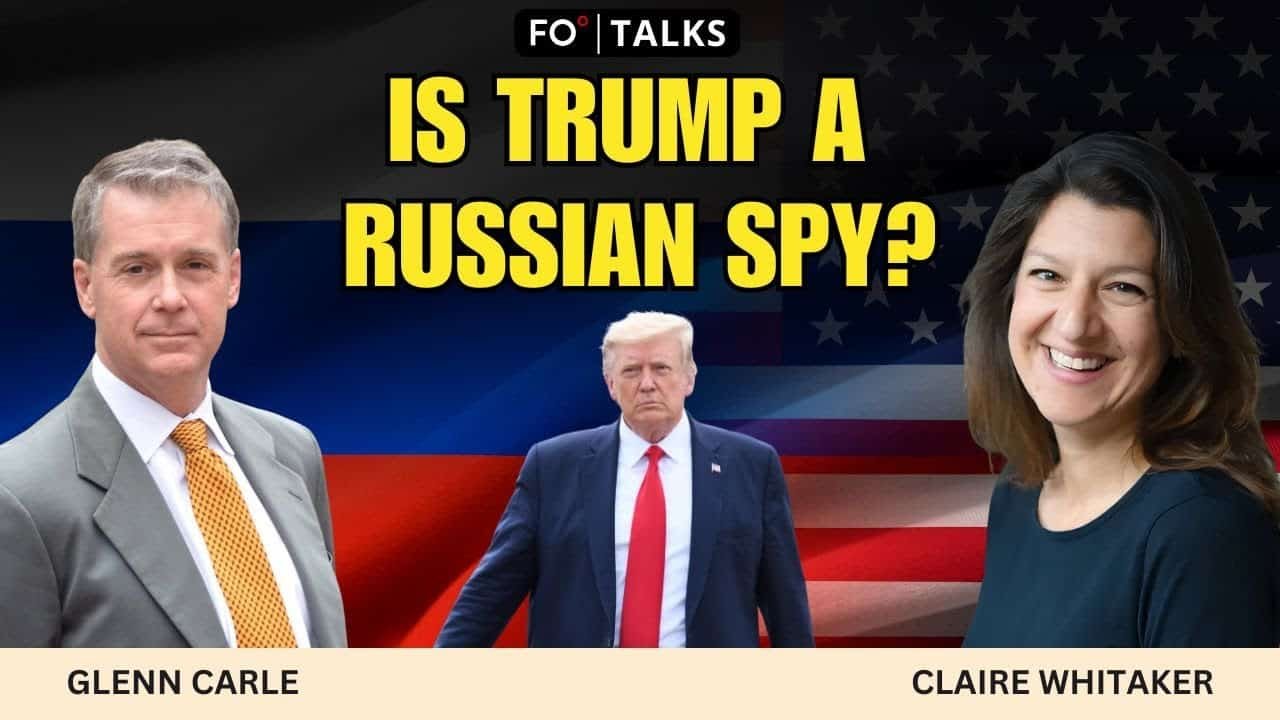
FO° Talks: Did Russia Recruit Donald Trump as a Spy? Former CIA Officer Reveals

Peter Isackson”
post_date=”July 12, 2025 05:54″
pUrl=”https://www.fairobserver.com/world-news/middle-east-news/fo-talks-denuclearization-or-regime-change-why-did-israel-strike-iran/” pid=”156488″
post-content=”
Israel’s military campaign against Iran is fueled by a blend of motivations — some strategic, some political, and others deeply existential. Israeli Prime Minister Benjamin Netanyahu sees this moment as a historic opportunity to protect Israel, cement his legacy and hold on to power in a time of domestic upheaval. For Netanyahu, this is not just a military campaign — it’s a personal and political imperative.
Core motivations behind Israeli actions
Existential threat. Israel regards the Islamic Republic of Iran as a fundamental, long-term threat to its survival. This belief is rooted in Iran’s open hostility, support for anti-Israel proxy groups, and ongoing nuclear ambitions. While Iran claims its nuclear program is defensive, Israel sees it as a direct challenge to its existence.
Political survival and personal legacy. Netanyahu’s leadership is under intense pressure at home, with growing protests and the threat of corruption charges if he loses office. In his eyes, a successful military campaign could reinforce his position and define his legacy.
Combating terror and regional destabilization. Israel presents itself as taking on what the West won’t: challenging a radical regime that funds terror groups and exports instability across the Middle East. This, in Israel’s framing, is about neutralizing not just Iran but its entire proxy network.
Rallying domestic unity. In a country bitterly divided over judicial reforms, religious military exemptions and political polarization, war acts as a temporary unifier. Netanyahu’s critics, however, argue that the timing is convenient — war distracts from internal dissent.
Shifting alliances and strategic autonomy. Having abandoned hopes of European support, Israel is laser-focused on securing American backing. It sees the United States as its only indispensable ally and is acting accordingly.
Israel’s multi-layered strategy against Iran
Israel’s short-term military goals are to:
Strike nuclear facilities. Israel’s immediate objective is to degrade or destroy Iran’s nuclear infrastructure, with reports already suggesting nuclear-targeted strikes have taken place.
Decapitate military leadership. Israel is systematically eliminating senior Iranian commanders, aiming to cripple Tehran’s ability to respond coherently and quickly.
Israel’s medium- to long-term goals include:
Regime change. Although not openly stated in diplomatic circles, regime change is a desired outcome. Israeli leadership sees this campaign as the beginning of that process.
Fragment Iran. The most ambitious version of Israel’s strategy envisions Iran fractured into ethnic and regional enclaves, much like post-civil war Syria — Baluchis secede, Iranian Azerbaijanis unify with Azerbaijan, Kurds establish autonomy or independence.
Collapse through internal pressure. Beyond bombs, Israel is counting on relentless economic pain — unemployment, inflation and widespread disillusionment among Iran’s youth — to eventually bring the regime down from within. The idea is that a society pushed to the brink will revolt.
Create a more liberal Iran. The long-term vision is a secular Iran, possibly led by a Western-leaning youth movement. A post-clerical Tehran would focus on trade and growth — “commerce, not chaos” — benefiting regional stability and Israel’s strategic position.
Doubts, risks and global implications
Is a regime change realistic? Critics, including UK intelligence agency MI6, call the idea of toppling the Iranian government through airstrikes and assassinations “delusional.” While urban elites might be disillusioned, Iran’s rural, conservative base — and more importantly, its armed forces — remain loyal to the regime.
The strikes may have blowback. Far from weakening Tehran, Israeli strikes may actually rally domestic support around the regime. Many Iranians, regardless of ideology, might resent foreign attacks, especially from Israel, which is widely condemned in the region for its war in Gaza.
Across the Atlantic, the US is walking a tightrope by offering air defense support to Israel but stopping short of direct strikes on Iran. While political pressure in Washington to back Israel remains high, the administration of US President Donald Trump is wary of being pulled into another Middle Eastern war without a clear exit strategy.
Other global powers sit on the sidelines. Europe is unlikely to back Israel militarily, especially amid outrage over its actions in Gaza. Russia is preoccupied with Ukraine but might make a quiet deal with Israel to stay out of Iran in exchange for concessions elsewhere. China wants Iranian oil but lacks the naval power to intervene far from home.
So, despite regional escalation risks, a global conflict remains improbable in the short term. But proxy wars, oil disruptions and economic ripple effects are all very much on the table.
Israel’s domestic fault lines and strategic memory
Israel itself is not without problems. The country is deeply divided over religion, governance and civil-military relations. While war might rally short-term unity, prolonged conflict risks deepening these internal fissures. Protests, especially among reservists, could reignite if public support wanes.
Any talk of regime change in Iran revives painful memories of past Western interventions — especially the 1953 US/UK-backed coup that removed the democratically elected Prime Minister Mohammad Mosaddegh and installed Shah Mohammad Reza Pahlavi. That event ultimately helped fuel the 1979 Islamic Revolution. Today’s Iranian regime still invokes that betrayal to justify its distrust of the West.
Where might this go?
This episode could lead to a temporary de-escalation. Both sides could eventually pause the conflict to claim political wins: Iran to protect its leadership and wealth, Israel to showcase operational success.
The fighting could escalate into a broader war. Iran could target US or European assets, ignite regional tensions in the Gulf or activate proxies like Hezbollah or the Houthis. Global oil markets would be the first to feel the shock.
This conflict could see a prolonged stalemate. Months of inconclusive fighting may drag on, sapping both economies and fueling domestic unrest, without delivering strategic breakthroughs for either side.
Final reflection
The future is murky. What’s unfolding is more than just a clash between two nations — it’s the unraveling of an old order. The post-Sykes–Picot map of the Middle East is dissolving, with fragmented states, emboldened non-state actors and a rising risk of a regional war with no clear end.
[Lee Thompson-Kolar edited this piece.]
The views expressed in this article/video are the author’s own and do not necessarily reflect Fair Observer’s editorial policy.
”
post-content-short=”
Israel’s military campaign against Iran is fueled by a blend of motivations — some strategic, some political, and others deeply existential. Israeli Prime Minister Benjamin Netanyahu sees this moment as a historic opportunity to protect Israel, cement his legacy and hold on to power in a time…”
post_summery=”Fair Observer Founder Atul Singh and Fair Observer Chief Strategy Officer Peter Isackson discuss Israel’s recent strike on Iran. The attack reflects a mix of existential fear, political calculation and long-term strategic ambitions, including regime change and regional reshaping. While Israel seeks to degrade Iran’s nuclear and military capabilities, critics warn that such efforts may backfire or spiral into wider conflict.”
post-date=”Jul 12, 2025″
post-title=”FO° Talks: Denuclearization or Regime Change: Why Did Israel Strike Iran?” slug-data=”fo-talks-denuclearization-or-regime-change-why-did-israel-strike-iran”>
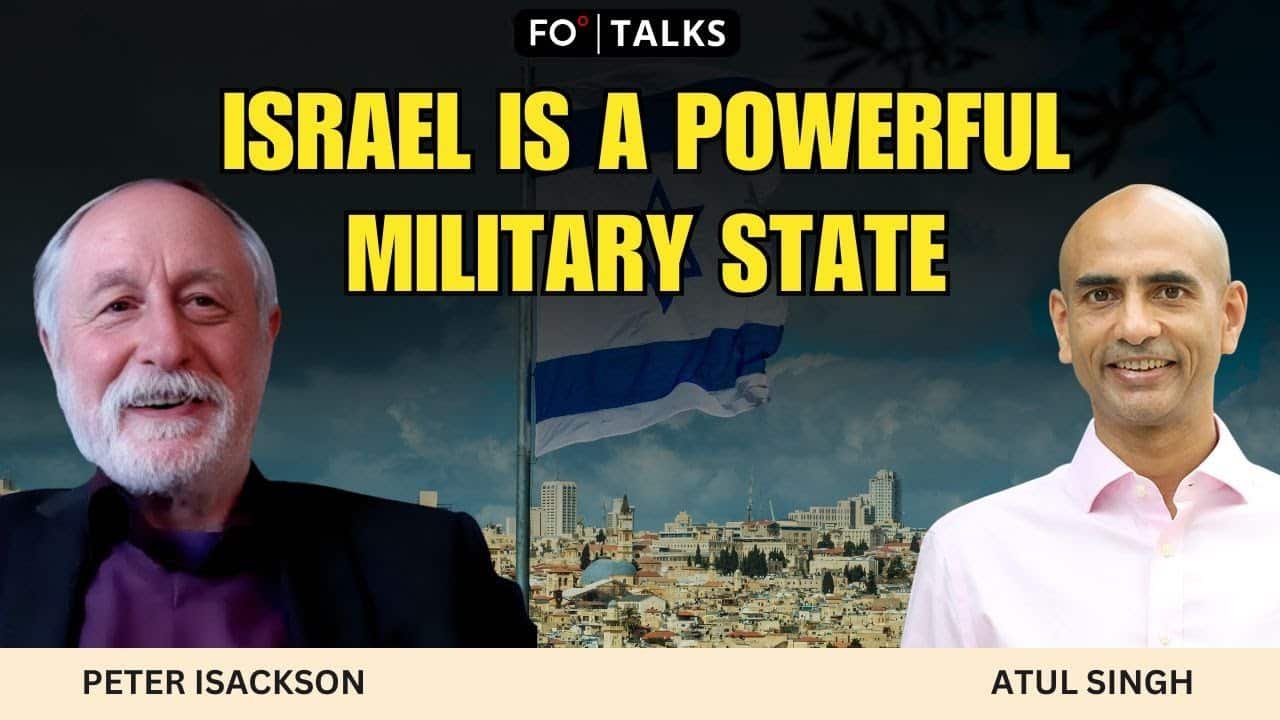
FO° Talks: Denuclearization or Regime Change: Why Did Israel Strike Iran?

Josef Olmert”
post_date=”July 11, 2025 06:54″
pUrl=”https://www.fairobserver.com/world-news/middle-east-news/fo-talks-israel-strikes-iran-tehran-hits-back-what-now/” pid=”156477″
post-content=”
In this episode of FO° Talks, Fair Observer Founder Atul Singh and former Israeli Government Official Josef Olmert unpack the June 13 Israeli strike on Iran. The operation had been in the works for years and showcased what Olmert called an “exceptional” intelligence breakthrough. Rather than the anticipated cyberattack or initial strikes on nuclear sites, Israel began by eliminating 20 key military commanders to paralyze Iran’s response capabilities, catching Tehran off guard.
The strike and its military impact
With the Iranian leadership disabled, Israel launched a powerful wave of attacks on Iran’s nuclear infrastructure. The site at Natanz was rendered inoperable, Farchan was hit and more attacks may follow, especially on the fortified Fordow facility. The Israeli military handled this operation with unprecedented speed and depth, eliminating the top opposition and smuggling helicopters. The attack also killed 14 elite scientists, severely hampering Iran’s nuclear ambitions.
Iran’s response and Israeli resilience
Iran retaliated with ballistic missile strikes. Israel’s air force, operating with near-total dominance over Iranian airspace, managed to take out launch sites before many rockets could be fired. Though Iran hit targets like Israel’s Hifa refinery and the Weizmann Institute, it failed to deliver any strategic damage.
Despite limited casualties, the psychological impact inside Israel is real. Rumors of mass flight are false; thousands of Israelis abroad instead rushed to return home.
Israel’s next steps to weaken Iran
With air supremacy secured, Israel’s next moves depend on political decisions. Israeli Prime Minister Benjamin Netanyahu could continue targeting military leadership, strike economic assets like oil infrastructure or symbolically humiliate the Iranian regime to encourage domestic unrest. Each path carries trade-offs: A bolder approach could trigger global pressure for a ceasefire, while restraint risks giving Tehran time to regroup. It’s a “catch-22,” with no easy solution.
Israel’s goals go beyond physical damage. It aims to make Iran’s nuclear program a wasted investment and sap the regime’s strength to project power. Central to Israel’s strategy is creating space for opposition. Iran, meanwhile, seeks to retain its status as a regional superpower, but Olmert believes it has already lost much of its credibility.
Prospects for regime collapse
Although a revolution may seem unlikely, such changes can come rapidly, faster even than Syrian dictator Bashar al-Assad’s regime collapse. While Iran’s minorities — Kurds, Baluchis, Arabs, Azeris — may play a role, the country’s internal complexity makes fragmentation improbable. The regime retains support from religious conservatives and the Islamic Revolutionary Guard Corps, though it has lost the younger, educated urban population. The absence of live appearances by Iranian leaders may signal the nation’s eroding legitimacy.
Strategic risks and the global response
Risks remain, including potential Iranian missile strikes on nuclear facilities like the Israeli city of Dimona or major airports. Olmert considers such scenarios unlikely but not impossible. He believes Tehran’s current behavior, including hints at closing the Strait of Hormuz or manipulating oil prices, reflects desperation. Moves like these would likely provoke US intervention, which would not serve Iran’s interests.
While Gulf countries officially denounce Israel’s actions, they are quietly pleased, even celebratory. Still, Muslim public opinion from Turkey to Indonesia has swung against Israel, feeding a siege mentality within Israeli society. Olmert warns that Iran might deliberately escalate toward catastrophe to trigger international demands for a ceasefire. G7 and NATO leaders may eventually pressure Israel.
Domestic politics and the long game
Has Israel overreached? Olmert says that the answer hinges on the fate of Iran’s regime. Netanyahu faces political challenges, but if he emerges with a decisive win, he could gain room to compromise on other fronts, including Gaza.
That said, Olmert notes Israel’s long-standing failure to convert military success into political capital, often constrained by its allies. The endgame, he argues, depends less on battlefield outcomes than on political shifts in Tehran.
[Lee Thompson-Kolar edited this piece.]
The views expressed in this article/video are the author’s own and do not necessarily reflect Fair Observer’s editorial policy.
”
post-content-short=”
In this episode of FO° Talks, Fair Observer Founder Atul Singh and former Israeli Government Official Josef Olmert unpack the June 13 Israeli strike on Iran. The operation had been in the works for years and showcased what Olmert called an “exceptional” intelligence breakthrough. Rather than…”
post_summery=”Former Israeli Government Official Josef Olmert analyzes Israel’s recent strike on Iran as a calculated and unprecedented move that decapitated the Iranian leadership before hitting nuclear sites. While Iran’s retaliation has caused limited physical damage, it has not shifted the strategic balance. The conflict’s trajectory now hinges on Israeli political decisions and whether Iran’s regime can weather the shock.”
post-date=”Jul 11, 2025″
post-title=”FO° Talks: Israel Strikes Iran. Tehran Hits Back. What Now?” slug-data=”fo-talks-israel-strikes-iran-tehran-hits-back-what-now”>
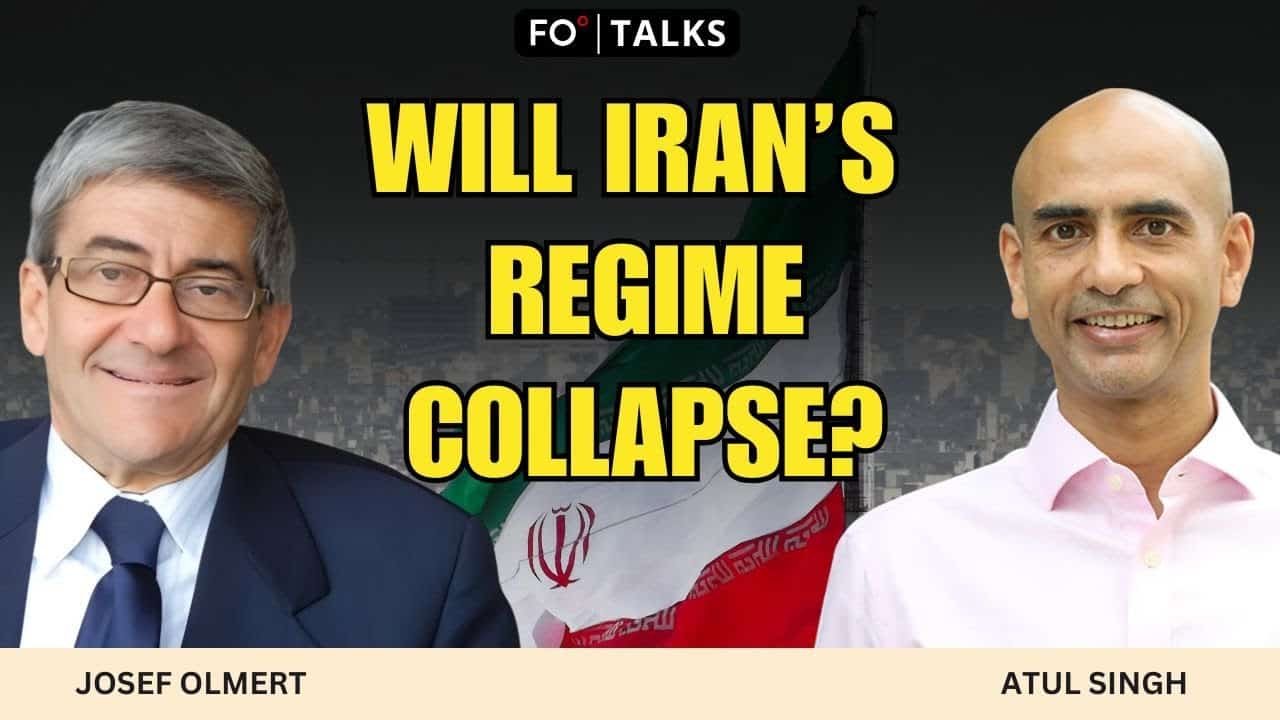
FO° Talks: Israel Strikes Iran. Tehran Hits Back. What Now?

Josef Olmert”
post_date=”July 10, 2025 06:43″
pUrl=”https://www.fairobserver.com/history/fo-talks-from-maga-to-gaza-how-trump-changed-us-israel-relations-forever/” pid=”156445″
post-content=”
[This is the final part of a four-part series. To read more, see Parts 1, 2 and 3 here.]
Josef Olmert: Hello. Hi to my watchers, to my readers, to my followers. This is the fourth and last in my short series on US–Israel relations. And the idea is really to lead us to the current situation with US President Donald J. Trump, his second administration, with a brief review of his first and the in-between period of the US presidency of Joseph Biden — Joe Biden Jr. — as president. And then we’ll come to the current situation, with the exception that I have to make already now: that we are in a situation that is unfolding. And there might be people who say, “Oh, it’s too early even to talk about US–Israel relations under Donald Trump.” So what I’m going to do is, therefore, to talk about what I consider to be situations that already are fully now results, and maybe inevitable results, of what we already discussed, and how they are happening right now — not talked about, but happening.
Therefore, if we make any predictions for the future, they will be based on what I would consider to be a more solid ground. That’s about the methodics of all that. And I need to say, because I do get reactions, comments, responses from people who watch, read, and they are asking questions that lead me to say what I’m saying to you now.
The American Jewish community and Israel’s image problem
Josef Olmert: So today, very briefly, just to remind you: In our previous episode, we discussed more in-depth processes, mostly in the American Jewish community, that led to changes in attitudes towards Israel. And we touched upon, therefore, what was happening in Israel at the same time that might have led to these changes in American attitude towards Israel, but also the rise of new movements in the US that were either more or less supportive of Israel. Of course, the evangelical Christians on the one end being more supportive; the left-wing, the progressive movement on the other side, in the Democratic Party mainly, that has been much more negative, still is, and becoming more and more negative.
And that brings us, really, to the situation that we are going to delve into in great detail today in our episode.
Trump’s first term: populism, promises and policy shifts
Josef Olmert: And I would say to you that when President Trump was running for president in 2015, 2016, he was not taken seriously, not just by Jews, but also by ordinary America, of course, the commentators. And I cautioned people at the time — it’s not like an “I told you so, period” — but I cautioned people, because I talked to people about the significance of the politics of identities and populist politics altogether, in the unfolding political climate in the US, as well as in other Western democracies.
And by the way, I gave the comparison with Israel. I analyzed the fact that Israeli Prime Minister Benjamin Netanyahu, Bibi Netanyahu, at that time was already in his sixth year as prime minister in his second term, after the one that he was in from 1996 to 1999 — this one was from 2009; we talk about 2015, 2016 — that Netanyahu also succeeded in Israel with the politics of populism and identities. And this is a successful political card.
And Trump made promises about Israel, and everybody said, “No, I mean, don’t take them seriously.” And he fulfilled, to a large extent, a great deal of his promises. For example, the moving of the embassy to Jerusalem, which was, by the way, the policy of every American president before him, with the exception that they didn’t fulfill their decision because of whatever reason that they gave. That was basically based on the idea, “Yes, we say to the Israelis and to the Jews and to the pro-Israel community, we want to move the embassy — but we can’t do it now.”
Trump did it. Trump also withdrew out of the Iran nuclear deal, as was expected by the Netanyahu government in Israel.
Let me say something here: Netanyahu was not wrong in his opposition to the nuclear deal as was devised by President Obama’s administration. Where were the problems that he had, and they have to do with what’s happening now, so therefore I’m saying them now:
He didn’t know the limits of, or the ways in which to express, his opposition to the Obama administration policy, and therefore he made a terrible mistake of showing in Congress and giving his speech — that was in March of 2015. In January of 2015, that is to say, two months before, the speech was announced by then-Speaker John Boehner. (By the way, I have a picture with John Boehner in my study, because I met him before — I met many other people.) And I then cautioned from getting biting gifts — I cautioned Netanyahu not to do the speech. That was a big mistake.
It comes back to what we discussed before in the previous episode about bipartisanship, or lack thereof, under Netanyahu. It was a big mistake.
The other mistake, which might have even been bigger, was that while he said no to the deal as was devised by Obama — with the support of other powers, as part of Obama’s internationalist policy — he did not offer any alternative. He basically created the impression from day one that all he wanted was to see an American military operation against Iran — or else to justify an Israeli one. But even then, he was not preparing one.
In 2011, the Israeli military establishment was waiting for a word from Netanyahu that he was giving the green light for an attack on Iran. He asked for three days to make a decision. He then said no. And there still are reports to that effect that even today, he basically did not approve all kinds of plans that were supposed to finance projects that were designed to improve technological abilities that were to be connected with an attack on Iran and so on and so forth.
So Netanyahu basically said to Trump, “Cancel the agreement, period,” without offering an alternative.
Why is this important? Because it’s the same mistake he has done since the beginning of the war in Gaza, on the 7th of October 2023, to this very moment. While he said, “no, no, no, no, no,” to everything offered by other people, to other countries, including the best friends of Israel, he does not provide any alternative.
Then Trump, for example, said something which is again interesting: that when the US, with Israeli support, decided to eliminate the arch-terrorist Qasem Soleimani, the head of the Quds Force of the Revolutionary Guards in Iran, Netanyahu said yes. And then he said no, he would not be part of it. Which, by the way, caused ongoing damage in the relationship between him and Trump, because Trump — and that we know already — doesn’t like what seems to be weak people, leaders, losers. For Trump, the fact that Netanyahu did not show up in the end, as opposed to what Trump did, was an indication of lack of stamina, resolve, real determination.
But there were also examples of how Israel was so helpful to the American administration. For example, in the war against ISIS, I don’t know how many of my watchers and listeners and readers remember that Trump, in public, said something that compromised the invaluable, great support that Israel gave to American intelligence to locate ISIS targets in Syria. Israelis were furious. But Trump said, “He’s a great friend.”
MAGA and the limits of right-wing support
Josef Olmert: Trump gave a lot of support also in the UN, the national organizations. But Trump also was the leader of MAGA, and that’s the point that I want to emphasize here. And we saw it after the incident in Charlottesville — if I even call it an incident, I believe what happened there in 2017, referring to “good people on both sides.” I immediately wrote an article in which I said, “There are no ‘both sides’ where there are swastikas.”
When Trump referred to “good people on both sides,” he also referred to those that were marching with people that waved the swastikas. That led me into discussion with myself about MAGA.
First of all, it was “America First,” which was a bad memory to me. For those who remember history — I mean, I don’t remember it from that time, but I know it — there was Charles Lindbergh with his America First Committee. That was basically a pro-Nazi domestic American organization that didn’t want America to join the Second World War. You can argue, “Okay, he just used the words; he didn’t mean very much.”
The MAGA movement is a nativist movement. The MAGA movement is isolationist. When you look at the roots of the MAGA movement, when you look at the terminology used, the symbols used, the organizations that were at the forefront of the movement, you have to come to the conclusion that this movement cannot be the pro-Israel movement that existed in the past under the great US President Ronald Reagan — when the world was divided according to the Cold War, and Israel was on that side, the good side. Or under US President George W. Bush, let alone previous presidents from before. Because their opinion about how the world is divided is totally different.
And nativist movements in America or in Europe, by definition, have more than a nucleus of antisemitism, because any movement which is also based on xenophobic feelings is bound to be antisemitic. And no antisemitic movement can be good to Jews, can be good to Israel. It’s as simple as that.
And it was very convenient to many Israelis to accept the better sides of Trump’s policies, but to ignore the roots of it that were based on assumptions and ideologies and terminologies which, as I said, by definition are not good to Jews and Israel.
And how many more times can I say it? How, with more decibels, stronger volume, to say it in order to make the point? Because it is a point that is still debated, even among Jews: What makes you really anti-Israel?
The MAGA movement was on the right side. The alternative to the MAGA movement as a mass mobilization political movement is the “woke” movement, which is, again, anti-Israel. The two most important political movements — and I say movements, not parties — in terms of mobilizing public opinion in the US from right and left, as developed in the last ten to 15 years, are not pro-Israel. And it’s just a question of time when these movements affect the political parties that they try to influence from the outside or by infiltrating from the inside. They already did it in the Democratic Party, and they are doing it now — and have done it — in the Republican Party.
And it will bring me to the current situation momentarily.
Biden’s presidency and the fracturing of democratic support
Josef Olmert: Joseph Biden Jr. — interesting fellow. I, by the way, met him personally: I had dinner with him in Tel Aviv in December of 2002, ahead of the invasion of Iraq. He came to visit the Middle East with a colleague from the Republican Party, Senator Chuck Hagel, a Republican from Nebraska who later became the moderate Republican defense secretary under US President Barack Obama; a much more moderate Republican than the Republican Party already at that time.
And Biden gave a brilliant prediction and analysis of what would happen in Iraq after the war. Because everybody knew there was going to be a war, the Bush administration would do it at that time. Much later on, I wrote an article in The Huffington Post, where I blogged for seven, eight years, praising Biden for the fact that he read and understood the situation in Iraq very properly. I also talked about the ethnic and sectarian divisions in all this.
The problem really is — and this is not something that we need to develop in this particular episode, because it’s much beyond the topic that we are discussing — Biden, who came to be president, was not the Biden of earlier years. And we understand it, Now we know more truth about it.
The Biden administration, from the beginning of its term, in all kinds of subtle ways that became much more obvious during the early stages of the war in Gaza — and much later on, as the war dragged on — developed the sense that we have problems with Israel. Exactly on the main core point of what the Israeli lobby and pro-Israeli lobbies all the time emphasized: that Israel is the only democracy in the Middle East, a beacon of freedom, of human rights, of civility and all that comes with it.
The attack on Israel with regard to that was already at the time of Jimmy Carter. But who remembers Jimmy Carter? He was way back.
Now, Biden, whether wittingly or not — I would say intentionally — slowly, gradually, systematically, consistently built up the case in all kinds of ways, undermining this Israeli argument or claim to fame, if you will.
The forefront of it was what’s called “The Squad” in the Democratic Party. And it was much beyond it. It infiltrated and crept into the trade union movement, the labor movement that in the past was one of the beacons of support for Israel; minority communities — African Americans, but also Asian Americans, which is very interesting; Latinos — tolerating the infiltration of Qatar and other states into universities in America, Saudi Arabia and others — relying on people that were clearly not in the pro-Israel camp anymore, but were at various levels of being anti-Israel.
And the fact is that while still a majority of the Democratic caucus in the House voted with Israel, there was a growing number of the progressives that were already taking their distance. So you could see the cracks in the bipartisan coalition for Israel.
The Netanyahu speech was, in that case, a gift he gave to these people. A stupid gift. Terrible mistake, as I said.
Trump’s second term: strategic ambiguity
Josef Olmert: The Trump administration these days — let’s move on now. First of all, in the last campaign that brought Trump again to the presidency — he didn’t even talk about Israel. He talked about Israel or the Middle East, made very, very superficial, almost insignificant comments or references. The promises were not there, you know.
Everybody took for granted that Trump is pro-Israel and will continue to be. The person that completely misread all this was Benjamin Netanyahu, again, in Jerusalem, believing that somehow Trump is going to be the same Trump of the first administration. He ignored the fact that in second administrations, presidents do tend to change.
I would remind people here that even Ronald Reagan — a great friend and supporter of Israel — he is the president that gave the first kosher certificate to the PLO before he left his second term. He was the one who authorized the beginning of official contact between the US and the PLO in 1989, as an example. But I can give you other examples.
Then came the inauguration, and I noticed something very interesting: While the inauguration was taking place, immediately afterward, US Special Envoy Steve Witkoff — I don’t get into too many details about him and his connections with Qatar, all this I leave to investigative journalism — but I don’t need to get into investigative journalism to analyze what he said on Inauguration Day, about what would be the four main pillars of American policy in the Middle East, the name “Israel” was not mentioned. The name “Iran” was not mentioned. The name “Hamas” was not mentioned.
Remember, it is in January of 2025, and the war was already raging from October of 2023. That was the first red light.
But forget about this. Maybe it was a ceremonial occasion. You don’t get into details, you just give main, big points and so on and so forth.
Gulf-centric policy and Israel’s marginalization
Then, of course, let’s see what has happened since then.
Some of his appointments have definitely been very pro-Israel. For example, Elise Stefanik, a congresswoman from New York, to be ambassador in the UN — and she made the point already, before: She’s going to fight hard about anti-Israelism in the UN as the first, if not the most important, but one of the main missions. This appointment, by the way, was canceled for all the obscure reasons. Why did he cancel her appointment, arguing that, “we need her in Congress,” when he did not cancel other appointments of people that had to resign from Congress and lead to early elections? I mean elections like in Florida. Well, I’m just leaving you with the question.
Ambassador Mike Huckabee — great, great supporter of Israel, there’s no question about it. But was he appointed as a policymaker? Or as the person that is supposed to say the good stuff to the Israelis, as opposed to the leaks coming consistently from the White House that are the bad stuff? Good cop, bad cop? Yeah — I leave my audience with this question.
All kinds of other appointments — I was skeptical about Pete Hegseth as defense secretary, for all kinds of reasons. I was skeptical about National Security Advisor Mike Waltz for all kinds of reasons. I did welcome the appointment, of course, of Marco Rubio as Secretary of State, for all kinds of reasons.
But — you know — instead of getting into every little detail, like this appointment, that appointment, let’s try to talk about three or four particular issues that are typical of what has happened, and still is happening, and would lead me, therefore, to a conclusion at the end of this discussion.
Take, for example, the question of fighting terrorism. Proud American President Donald Trump surrendered. Yes, he surrendered to the Houthis in Yemen. He gave up to terrorists because he allows them, maybe even encourages them indirectly, to keep attacking Israel, but not attacking America. Sure, it’s a pro-American move: “We don’t attack America.” But is it a pillar of your foreign policy to abandon a friend and ally like that?
Cautionizing, legitimizing attacks on Israel by saying, “You can do that. What can I do?”
Donald Trump started the negotiations with Iran with changing views about what the demands from Iran are. And we still don’t know the final outcome of all that. But if the final outcome would be that Iran is still allowed to maintain a nuclear program — even for civilian purposes — it means that he doesn’t do anything different than what the Obama administration did.
Donald Trump put pressure on Israel to stop the war in Lebanon, exactly at the time when Hezbollah was ready to get the final blow from Israel. Yes, in the Lebanese situation, after 11 months of relative inaction by Israel, finally, Netanyahu, under pressure, decided to take the initiative. And it paid off so well to Israel, because this was the area in which you can talk specifically about the total defeat, almost, of the terrorists. Why “almost?” Because something else was needed to finalize the job. And then the American administration put a stop to it.
Donald Trump promised hell to Hamas in Gaza if they don’t release all the hostages within a short period of time. Nothing of this happened, of course. Edan Alexander was released — it is great news, fantastic news — but he is one hostage and an American citizen, which is also raising questions about the division between Americans and Israelis. You fight terrorism, you fight terrorism — it is one problem.
And I can go on with some more examples like this.
Where does it come from? Where was the Israeli reaction? And therefore, how do we put it all in perspective? Where it comes from is Trump’s version of isolationism. And many people will say it’s great, it’s a good American interest. So if that’s an American interest, not to get into war almost at all cost, I will be the last one to criticize it. But I need to mention it in the context of the Middle East. Because what does it mean? It means that we tolerate the terrorists, that we coexist with them. And for the sake of clarity, I will refer not just to people like the Houthis or Hezbollah or Hamas, but Iran.
Donald Trump doesn’t really care, apparently, about the fact that these systems will continue to exist. If he believes that by coming to some accommodation with them, he will be able to tame them, that’s a terrible, terrible mistake. Taming the shrew — ah! Impossible.
But if it falls into the basic tenets of how he views American isolationism and his supporters, then I can understand that there are implications.
Donald Trump wants political solutions that will be short-sighted — short of one situation that he raised and then did nothing about, which I immediately criticized, arguing it’s not going to happen because it’s just not even a half-baked cake. This is the talk about removing all the people of Gaza. It’s — let me use a non-diplomatic word — nonsensical.
But what helps him in that is that, yes, he has done already now some things that are very pro-Israel. He unfroze the embargo on arms to Israel that was basically imposed by Biden. He ordered his people in the UN organizations to continue to support Israel, even though it hasn’t yet come to any big test, like, say, a resolution in the Security Council about possible sanctions against Israel. That remains to be seen.
And at the same time, he makes it very clear that the focal countries of his new policy in the Middle East are the Gulf states: Saudi Arabia and Qatar, mainly, and the UAE, because they have something that Israel doesn’t have. They have the resources, the money.
And to give a kosher certificate, for example, to Qatar is the total opposite of anything which is like fighting terrorism. It is the greatest possible encouragement of terrorism because of what Qatar is and who the Qataris are. It’s as simple as this.
Israel’s paralysis and the waning American umbrella
Josef Olmert: What helps him with all that is — and that brings me back to what we already discussed — the total paralysis of the government of Israel under Benjamin Netanyahu. Netanyahu has no alternatives to anything, has no proposals to anything, has no initiatives — because he cannot do anything if he wants to maintain his current coalition, which is based on some lunatic — I would say lunatic — extreme right-wing parties, led by Israeli Minister of National Security Itamar Ben-Gvir and Israeli Minister of Finance Bezalel Smotrich. And for Netanyahu, this is the number one interest.
So even if Netanyahu were to change a little bit on all kinds of issues, or even to a large extent, it may not have changed completely the overall perspective that Trump has about how he should do his own policies and conduct them. But when Netanyahu does nothing and offers nothing, it makes it so much easier.
And that is the same mistake that Netanyahu has done throughout his political career — and definitely when it came also to the Obama administration: to say no with great, polished English is all very nice and easy. But to say yes requires courage, resolve, determination, leadership, which he lacks.
And what happens now is that because of the distance that is being created between Trump and Israel — he’s in the Middle East, but not in Israel. He’s praising Recep Tayyip Erdoğan, he’s meeting the terrorists like Mohammad al-Julani in Syria, Qatar and Saudi Arabia, the model countries for relations with the US. More and more countries are encouraged now to take more and more anti-Israel positions because they believe that the balance is changing. The umbrella of defense provided to Israel by the US is weakening, if not in the process of disappearing — which is, again, something very bad to Israel.
A troubling future for US–Israel relations
Josef Olmert: I can go on and on. I think I’ve said enough to lead me to interim conclusions.
Beware, Israel. The second administration of Donald J. Trump is going to be the greatest challenge to Israeli foreign policy in our memory, definitely in my memory. And I’m not a young person.
Israel will have to understand that America is changing. And with it are changes in American foreign policy, also in the Middle East.
And I will sharpen the point here by saying: The changes about Israel between this administration of Trump and the first one — in terms of the action but also the image, the perceptions — are just so important. These changes will not be the ones that will lead to a rebellion against Trump in the Republican Party, even by the greatest supporters of Israel, short of maybe a few. If there will be a rebellion against him, but it will be over other issues: the effect of the tariffs, the economic situation, the index of living, inflation, success or failure on the southern border and so on and so forth.
And that’s where we are standing, from the perspective of being in Israel now with less and less bipartisan support. If the Republican administration is the one that is changing the way I described, Israel cannot expect the Democrats to pull the chestnuts out of the fire for Israel. That could not happen.
So I have to leave my audience with this perspective: that for those who care about Israel and for Israel — and I’m one of them, of course — this is a very troubling, pessimistic, but I believe realistic assessment of the situation.
Thank you all.
[Lee Thompson-Kolar and Kaitlyn Diana edited this piece.]
The views expressed in this article/video are the author’s own and do not necessarily reflect Fair Observer’s editorial policy.
”
post-content-short=”
Josef Olmert: Hello. Hi to my watchers, to my readers, to my followers. This is the fourth and last in my short series on US–Israel relations. And the idea is really to lead us to the current situation…”
post_summery=”In the final episode of this four-part series, Professor Josef Olmert examines the transformation of US–Israel relations under US President Donald Trump’s second administration, and expresses that American isolationism and political polarization are undermining traditional bipartisan support for Israel. He contrasts Trump’s unpredictable stance with Israeli Prime Minister Benjamin Netanyahu’s strategic paralysis, calling both detrimental. Olmert concludes with a stark warning: Israel faces its greatest foreign policy challenge in decades.”
post-date=”Jul 10, 2025″
post-title=”FO° Talks: From MAGA to Gaza: How Trump Changed US–Israel Relations Forever” slug-data=”fo-talks-from-maga-to-gaza-how-trump-changed-us-israel-relations-forever”>
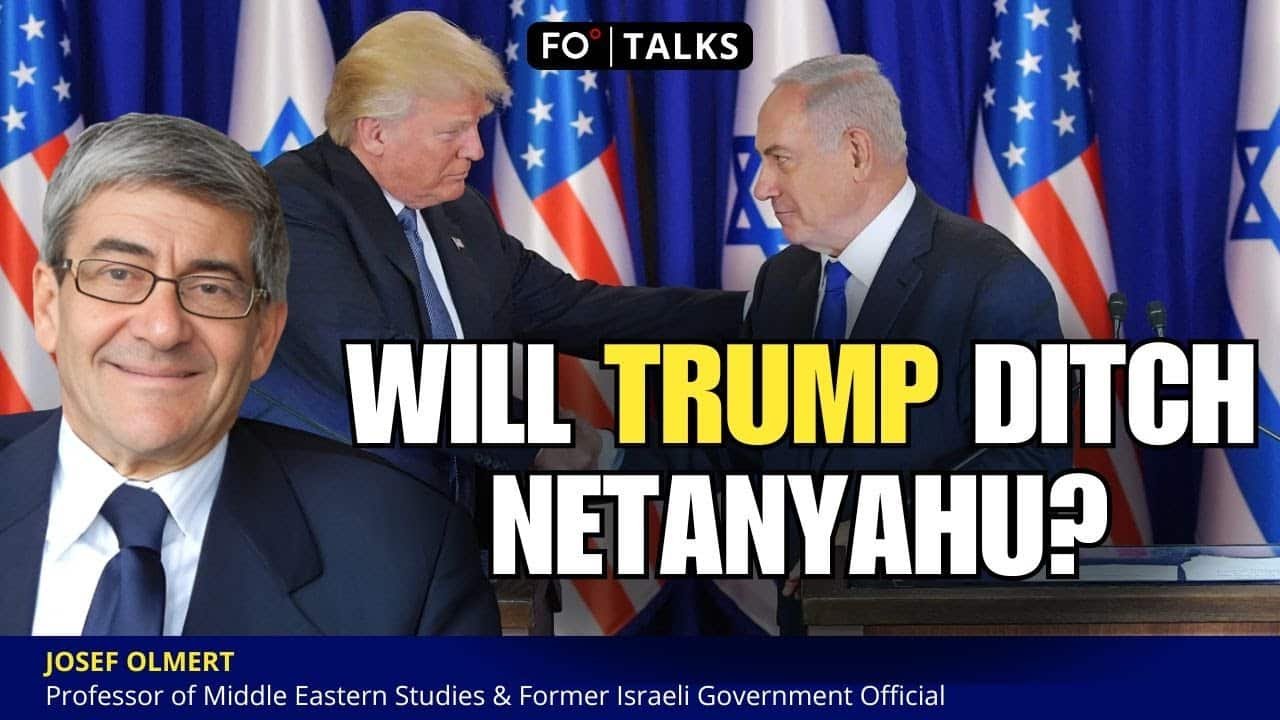
FO° Talks: From MAGA to Gaza: How Trump Changed US–Israel Relations Forever
